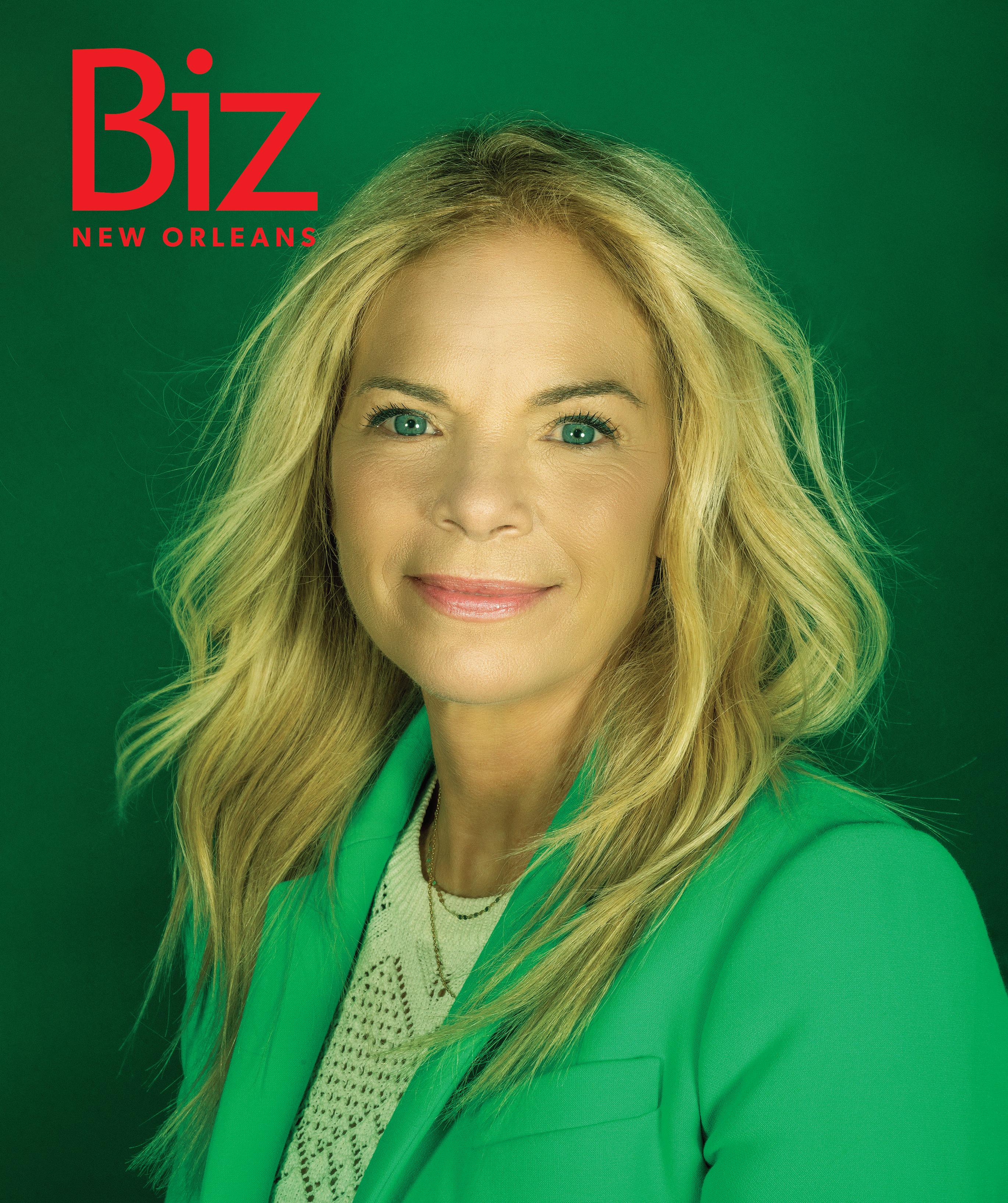
MARCH 2023 Supply Chain Survival Top tips for coping P. 26 Don’t Be a Victim at Tax Time The latest scams to watch for P. 40 $10 Million for Startups All the details on Tulane’s new fund
ENTREPRENEUR ISSUE
Kimberly Gramm, chief innovation and entrepreneurship officer at Tulane University


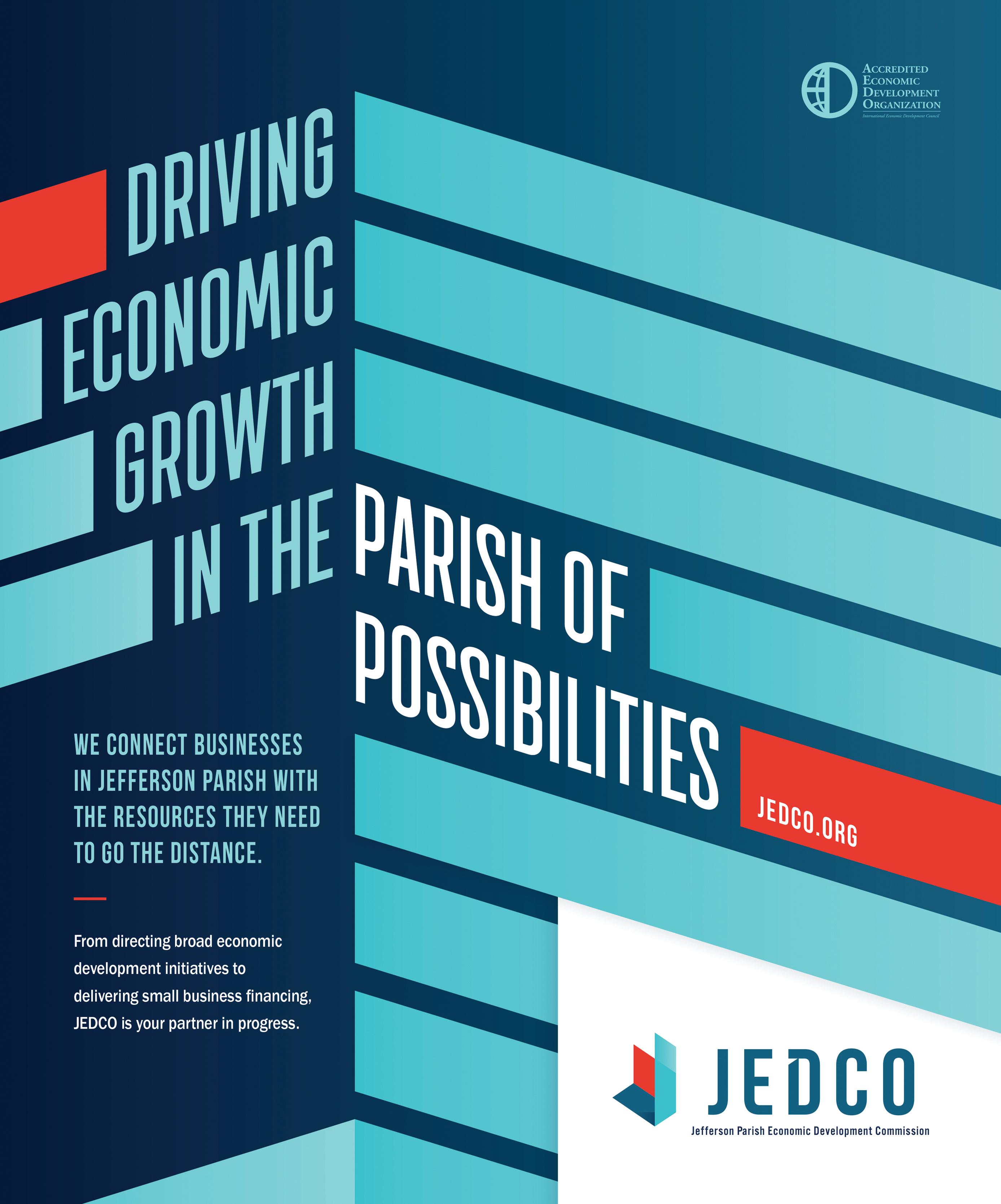
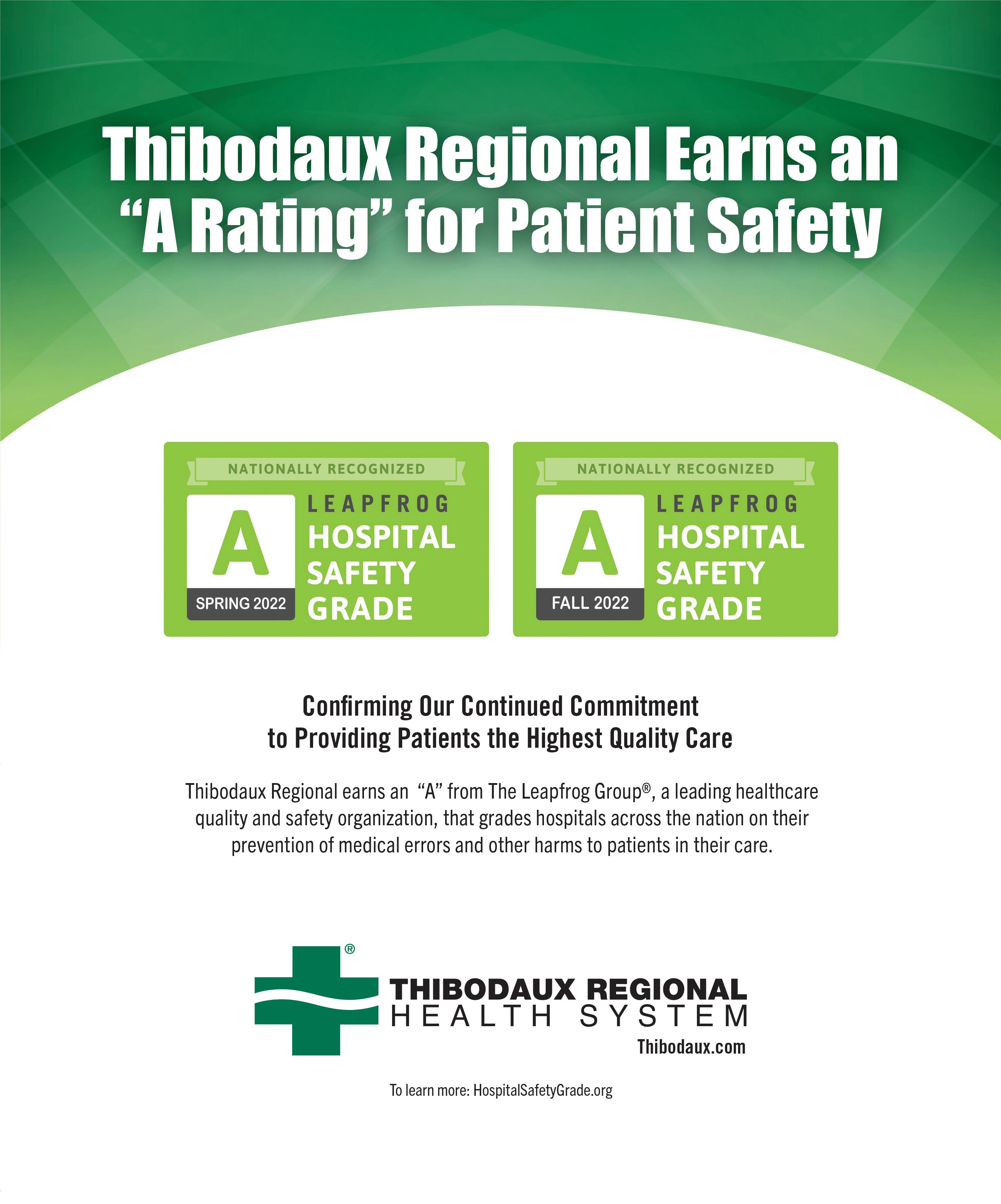



60

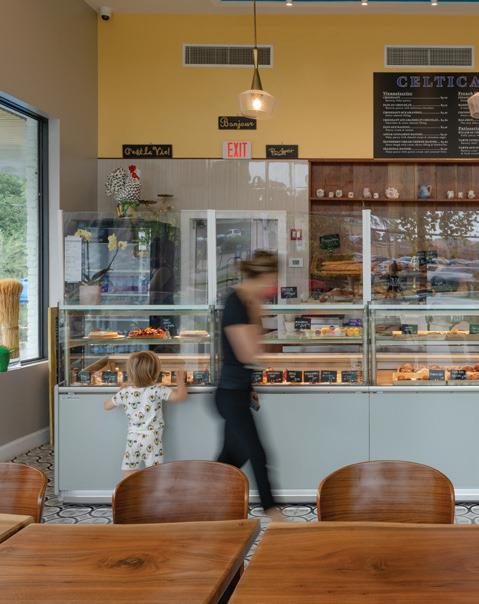
WHY DIDN’T I THINK OF THAT?
Opened this past May in Metairie, The Exercise Coach uses proprietary smart equipment to help people achieve their fitness goals more efficiently.
64 NEW ORLEANS 500 Marv Ammari, CEO of Creole Cuisine Restaurant Concepts
Kimberly Gramm shares the
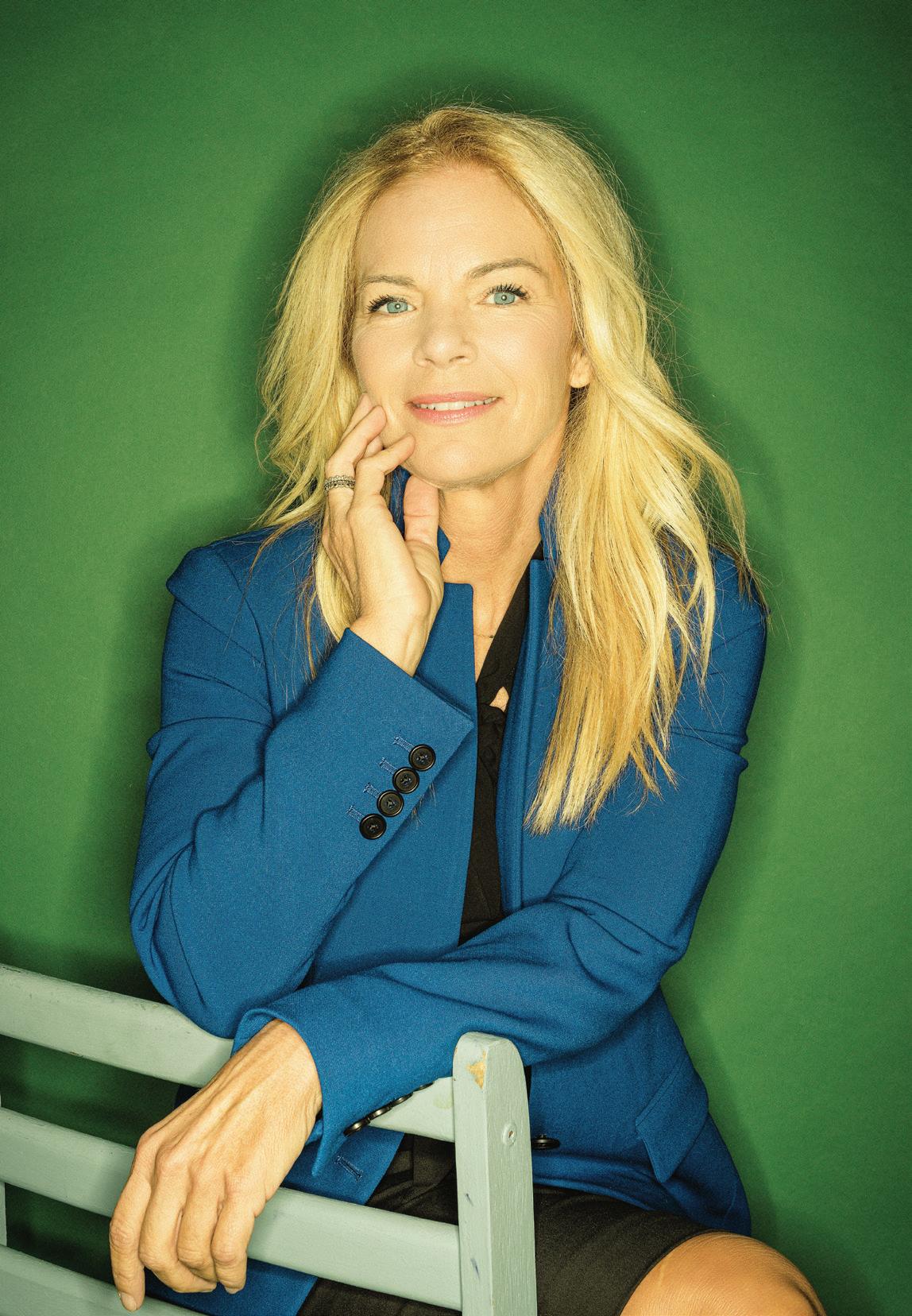
30 REAL ESTATE + CONSTRUCTION What upcoming projects are you most excited about? 32 BANKING+FINANCE What happens to a bank in a natural disaster? 38 ECONOMIC DEVELOPMENT What’s new at NOEW 40 GUEST Tax time is prime time for scammers. Here’s what to look out for. EVERY ISSUE FROM THE LENS PERSPECTIVES 08 EDITOR’S NOTE 10 PUBLISHER’S NOTE 12 ON THE WEB 14 WORD ON THE STREET IN THE BIZ 20 DINING Two local restaurants transport the sights, smells and flavors of Africa to the Crescent City 22 TOURISM French Quarter Festival celebrates 40 years and a focus on sustainability 24 SPORTS Thoughts on Payton’s return as head coach of the Broncos 26 ENTREPRENEUR Tips on dealing with continued supply chain issues
VOLUME 09 ISSUE 06
56
modern
to Lakeview 34 HEALTHCARE Racial and social disparities in healthcare are a deadly fact in the U.S., but local healthcare systems and practitioners are finding ways to make changes for the better. 48 When Off the Shelf Won’t Do Have a problem that calls for a tailor-made solution? It may be time to turn to custom software. 42 A $10 Million Boost for Entrepreneurism
MARCH
GREAT WORKSPACEST Celtica French Bakery brings
Parisian flair
details behind Tulane University Innovation Institute’s new startup fund.
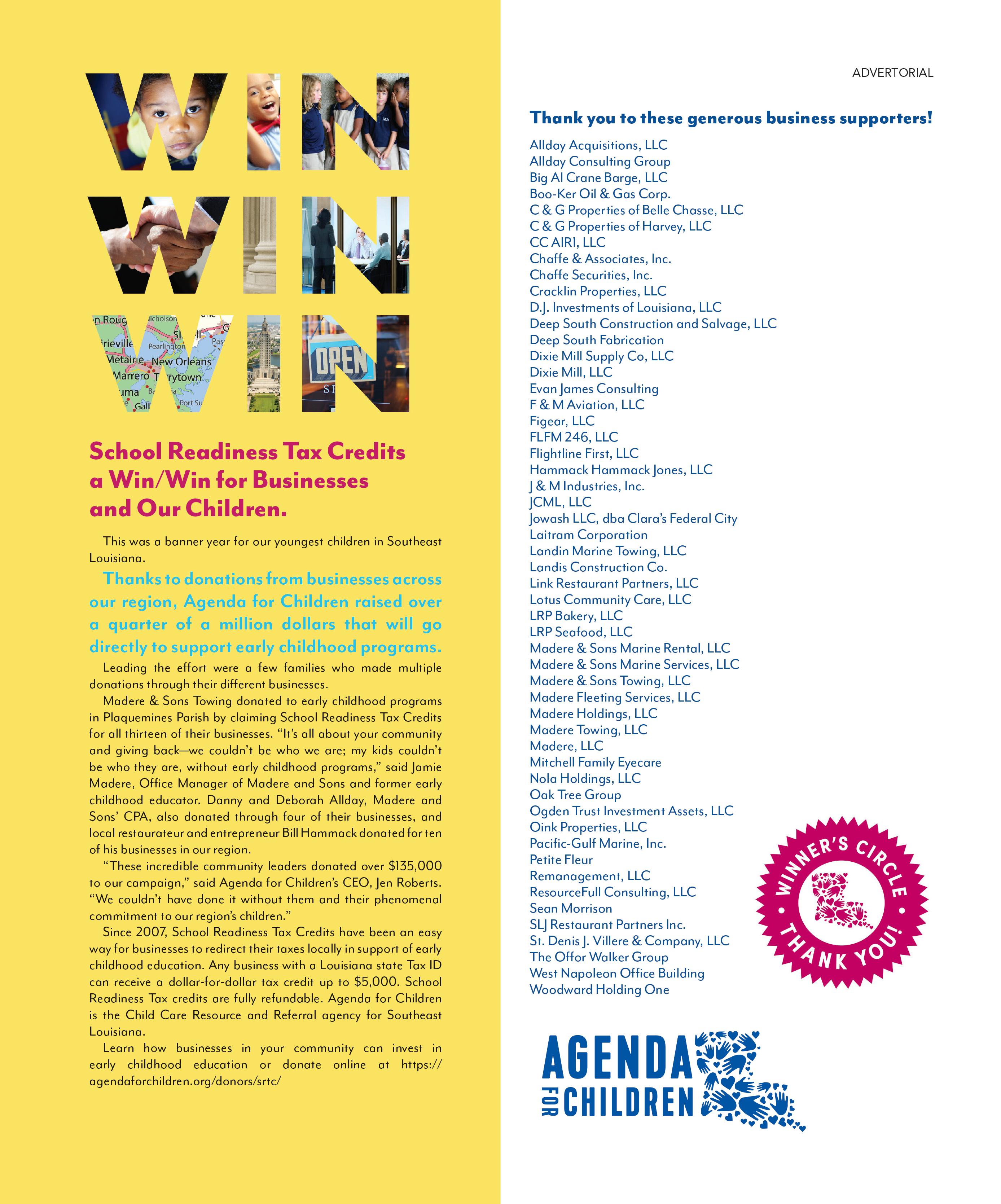
Talking Tech
During our latest Publisher’s Luncheon — where we invite a handful of local business leaders to lunch and invite them to share their latest news — we were honored to be joined by quite a few fascinating people, including City Councilmember Joe Giarrusso and insurance specialist Ryan Daul. As you can imagine, there was lots of talk about the challenges New Orleans is facing right now on many fronts.
But we know the challenges, don’t we? They are not news. To me, the real news, what everyone really wants to hear about, is what’s being done about these challenges and how about what’s going right in our city? That’s what we aim to focus on in Biz New Orleans Magazine. Who is getting it done and what are they doing to move us forward?
In this, our annual entrepreneur issue, we’re excited to provide plenty of good news, starting with our cover Q&A with Kimberly Gramm. Tulane University’s chief innovation and entrepreneur officer, Gramm gave us the inside scoop on the university’s new $10 million startup fund — an exciting venture from the new Tulane University Innovation Institute. Aiming to focus on those who commonly struggle for resources, the fund and its accompanying programs and services, are aimed primarily at entrepreneurs who are women and/or people of color. Applications are being accepted this spring, so if you’re in that category, I encourage you to reach out!
This issue looks at a wide array of ways technology is solving today’s problems — whether
it’s on an individual business level, helping companies increase efficiency with custom software, or tackling larger societal issues that greatly affect our economy, like digital solutions that are helping healthcare providers address health inequities.
Digital solutions are even out there to help us get fit faster, like you’ll see in this month’s Why Didn’t I Think of That? feature on a new company launched in Metairie called The Exercise Coach. Mardi Gras is over people — it’s time.
Of course, technology can also be used in nefarious ways, which the writer of this month’s Guest Perspective, Frank Toro, reminds us of with some helpful tips on how to avoid scammers during tax time.
Finally, one last tech note: If you’re a podcast lover and you haven’t checked out our weekly BizTalks podcast, I encourage you to visit BizNewOrleans.com and give it a listen. Each approximately 20-minute episode is a conversation with a local business leader you’re sure to enjoy.
Happy Reading,
KIMBERLEY SINGLETARY Editor
Kimberley@BizNewOrleans.com
Publisher Todd Matherne
EDITORIAL
Editor Kimberley Singletary
Art Director Sarah George

Digital Media Editor Kelly Massicot
Associate News Editor Rich Collins
Perspective Writer Drew Hawkins
Contributors Liz Maxwell, Ashley McLellan, Chris Price, Jennifer Gibson Schecter, Melanie Warner Spencer, Poppy Tooker, Frank Toro, Keith Twitchell
ADVERTISING / MARKETING
Senior Account Executive Jessica Jaycox Mahl (504) 830-7255 JessicaJ@BizNewOrleans.com
Senior Account Executive Meghan Schmitt (504) 830-7246 Meghan@BizNewOrleans.com
Business Development Coordinator

Becca Rubenstein
Sponsored Content Coordinator/Copywriter Faith McClean
RENAISSANCE PUBLISHING
PRODUCTION
Manager Rosa Balaguer Arostegui
Senior Designer Meghan Rooney
CIRCULATION

Subscriptions Jessica Armand
Distribution John Holzer
ADMINISTRATION
Office Manager Mallary Wolfe
VP of Sales and Marketing Kate Henry
Chief Executive Officer Todd Matherne
For subscriptions, call (504) 830-7231
8 BIZ NEW ORLEANS MARCH 23
110 VETERANS BLVD., SUITE 123 • METAIRIE, LA 70005 • (504) 828-1380 2022 Gold Best Feature Gold Best Recurring Feature Silver Best Feature Layout 2021 Gold Magazine Design Gold Best Explanatory Journalism Gold Feature Design Silver Best Feature Bronze Best Use of Multimedia 2020 Silver Best Recurring Feature 2019 Gold Best Recurring Feature Gold Best Explanatory Journalism 2018 Gold Most Improved Publication Silver Best Recurring Feature 2017 Silver Best Recurring Feature Bronze Best Daily Email 2016 Bronze Best Feature Layout
EDITOR’S NOTE
Biz New Orleans is published monthly by Renaissance Publishing, LLC, 110 Veterans Memorial Blvd., Suite 123, Metairie, LA 70005; (504) 828-1380. Subscription rate: three year $49.95, no foreign subscriptions. Postage paid at Metairie, LA, and additional mailing entry offices. POSTMASTER: Send address changes to Biz New Orleans, 110 Veterans Memorial Blvd., Suite 123, Metairie, LA 70005. Copyright 2023 Biz New Orleans. No part of this publication may be reproduced without the consent of the publisher. The trademark Biz New Orleans is registered. Biz New Orleans is not responsible for unsolicited manuscripts, photos and artwork, even if accompanied by a self-addressed stamped envelope. The opinions expressed in Biz New Orleans are those of the authors and do not necessarily reflect the views of the magazine or owner. NEVER MISS AN ISSUE, SCAN AND SUBSCRIBE TODAY



9 BIZNEWORLEANS.COM
The Chamber is Charged Up
Three months in and the New Orleans Chamber is rockin’.
This year, I am honored to be the chairman of the New Orleans Chamber of Commerce, and in three short months, Sandra and her team are moving things forward for members and the business community.
For the first time, last month the chamber hosted a reception at Mystick Krewe of Louisianian’s Washington, D.C., Mardi Gras to showcase and enhance the presence of the organization and its membership. This could not have happened without the sponsorship support of Verizon, Port of South Louisiana, Chalmette Refinery and Antares Technology Solutions.
Back home in New Orleans, during Mardi Gras the chamber team launched a “Coffee for Cops” campaign to thank our officers with a gift card to PJ’s Coffee. The team visited police districts and handed our individual gift cards to officers to show appreciation and support of their work every day.
Next month, on April 19th, the chamber will host its annual Power Up: Women’s Leadership Conference presented by Fidelity P.O.W.E.R. at the New Orleans Ernest N. Morial Convention Center La Nouvelle Orleans Ballroom.
This day-long event is one our entire Renaissance Publishing staff looks forward to attending every year. Tickets and sponsorships are available, and you can call the chamber office at (504) 799-4260 for more details.
The chamber also hosts a monthly Power Hour, the Women’s Business Alliance, education seminars, the Chamber After 5 and numerous ribbon cuttings. The chamber offers so many opportunities for its members to network and connect in the business community. If you are not a member, visit them online and join today. NewOrleansChamber.org.
Also kicking off this month, on March 27 don’t miss the start of Idea Village’s New Orleans Entrepreneur Week (NOEW). This six-day entrepreneurial fest brings together business leaders, startup founders, industry experts, investors and aspiring entrepreneurs to not only celebrate but learn, network, and foster new connections to succeed. Biz New Orleans is proud to be a supporter of this event.
As New Orleans moves into spring, business networking kicks up a notch, so I’ll see you around town making business happen.
KATE HENRY

VP of Sales and Marketing (504) 830-7216

Kate@BizNewOrleans.com
CEO and Publisher Renaissance Publishing

Senior Account Executive (504) 830-7255
JessicaJ@BizNewOrleans.com
MEGHAN SCHMITT


Senior Account Executive (504) 830-7246
Meghan@BizNewOrleans.com
10 BIZ NEW ORLEANS MARCH 23
TODD MATHERNE
JESSICA JAYCOX MAHL
PUBLISHER’S NOTE SALES TEAM



11 BIZNEWORLEANS.COM
City Councilmember Eugene Green at an event on Feb. 6 celebrating the addition of four new electric vehicle charging stations at the Audubon Zoo. L to R: New Orleans Mayor LaToya Cantrell, City Councilmember Oliver Thomas (in car), Entergy New Orleans President and CEO Deanna Rodriguez, Audubon Institute CEO Ron Forman and City Councilmember Eugene Green

THE BUSINESS COMMUNITY IS TALKING ON BIZNEWORLEANS.COM

Catch all the latest news, plus original reporting, people on the move, videos, weekly podcast and blogs, digital editions of the magazines and daily Morning Biz and afternoon newsletters. If it’s important to business in southeast Louisiana, it’s at BizNewOrleans.com.
BIZ TALKS PODCAST
A big win would be filling each of our academy classes this year. We just started a class with, I believe, 19 cadets, and we could have had 30 to create a full class. … On an annual basis, 150 new recruits should be our target given the typical amount of attrition we see of between 70 and 80 officers a year.
EPISODE 138
To the Moon, Michoud!
After leading a team of over 1,000 to help build the most powerful rocket ever launched last fall, 2022 Executive of the Year Jennifer BolandMasterson, director of manufacturing and site leader for the Boeing Space and Launch program, shares what her team is up to now.

EPISODE 137
Dan Mills Says Stronger Roofs Could Bring Back Insurers
CEO of the Home Builders Association of Greater New Orleans Dan Mills says the majority of insurance claims during recent Louisiana hurricanes were caused by roof failures that could be prevented by improved installation techniques. He says getting the region’s roofs up to code could be the key to solving the current residential insurance crisis.

12 BIZ NEW ORLEANS MARCH 23
ON THE WEB BIZNEWORLEANS.COM
Jim Cook, general manager of the Sheraton New Orleans and leader of the Business Council of New Orleans Criminal Justice Task Force, speaking at the NOLA Coalition’s Feb. 7 press conference. At the event, the group provided its 180-day update on its plan to increase public safety and invest in area youth.
Listen to those birds. Look at this beautiful sky. This is why we need to be very deliberate in our attempts to lower our carbon footprint. We want our great grandchildren to come to the Audubon Zoo on a beautiful day like this and be able to hear birds and see the sunshine. This is about the future of our city, the future of our nation, and the future of this world.



13 BIZNEWORLEANS.COM
WORD ON THE STREET NEW ORLEANS 500 SURVEY
Is the Legislature on the Right Track?
Business leaders share their thoughts on solving Louisiana’s insurance crisis
 BY RICH COLLINS
BY RICH COLLINS
Affordable housing advocate
Andreanecia Morris is not a big fan of the Louisiana Legislature’s recent $45 million spending plan to entice insurance companies to return to the state. Morris, the executive director of the nonprofit group HousingNOLA, said there’s no guarantee the law will attract stable or reputable insurers.

“Louisiana has to stop investing in private companies and entities to save its citizens,” she said in her response to the most recent New Orleans 500 email survey. “We must invest in ourselves and in our communities.”
Morris is concerned that the companies that return to write policies in the state will “cherry pick” customers with higher credit scores, higher incomes and lower risk — and she’s worried the incentive program does nothing to protect the state’s most vulnerable renters and homeowners. As an alternative, she supports plans to fortify Louisiana Citizens Property Insurance Corporation, the state’s insurer of last resort.
NEWS FROM THE TOP Each month, we ask the top business professionals featured in the New Orleans 500 to weigh in on issues impacting the New Orleans business community. Have an idea for a survey question for the New Orleans 500? Email rich@bizneworleans.com.
“One-time surplus funds could create a program that subsidizes insurance premiums for low-to-moderate income homeowners and for landlords who are providing affordable housing,” she said. “Finally, we need a long-term solution: we have to invest in improving our housing stock. Long term plans should ensure that housing is guaranteed for all and a system is in place that helps residents mitigate the next crisis — not simply survive it.”
Morris said that building science has “evolved to the point where we can strengthen homes by improving the roofing system and increase the property’s ability to withstand the next storm.” She supports implementing the 2021 International Energy Conservation Code, which establishes minimum requirements for energy-efficient buildings. Morris also urges state leaders to take advantage of federal funds from pandemic relief, the Infrastructure and Jobs Act and other sources.
“We cannot allow the missteps made with Katrina and Rita relief that left too many behind,” she said. “Those still struggling after Hurricanes Laura, Delta, Zeta and Ida need impact investment to truly recover and be able to survive the next storm.” T
To improve affordability of insurance and homeownership in the region, a multifaceted approach is necessary. As homeowner’s insurance and auto insurance are interrelated, comprehensive tort reform is required to align with other states in the area. Additionally, there is a need for a complete overhaul of the flood and pumping system management and infrastructure in New Orleans. Although the $45 million incentive fund is a positive step, we should take more assertive measures to reduce the increasing cost of reinsurance for carriers, similar to what has been done in states like Florida.
P. David Soliman, managing partner at Faubourg Private Wealth

BELL
Managing Partner
U. S. Forensic
Promote flood insurance coverage on all policies that are subsidized by the state. Flooding is an underinsured risk in Louisiana that occurs with every hurricane and can happen anywhere. FEMA reports that 30% of all flood claims occur in low-risk flood zones.
Work with carriers to instill good practices when they enter into the market in order to eliminate the need for bad faith legislation. Also increase the amount required to enter into our market to prevent further insolvencies.
14 BIZ NEW ORLEANS MARCH 23
FOR MORE THOUGHTS FROM LOCAL BUSINESS LEADERS ON THIS TOPIC, VISIT BIZNEWORLEANS.COM/500 AND SCROLL DOWN TO THE LATEST NEW ORLEANS 500 SURVEY
GARY
KRISTIN SWANSON SCOTT Owner Swanson Insurance Agency


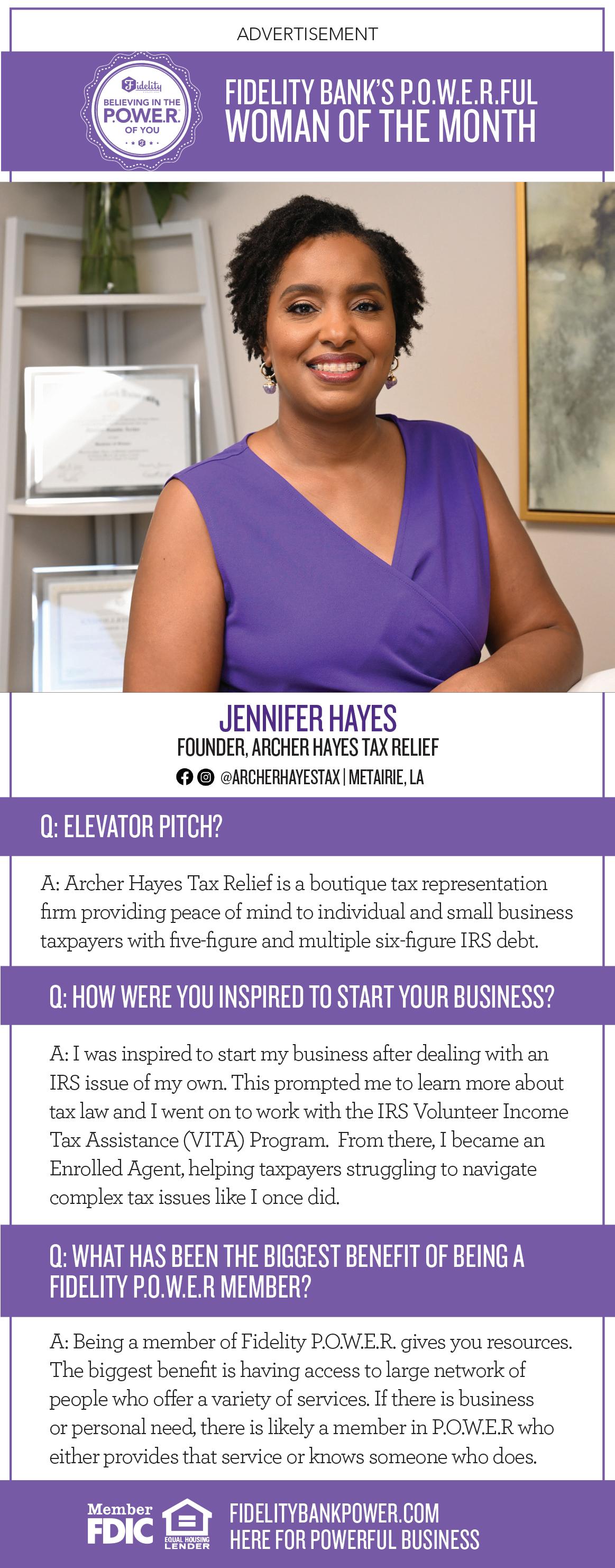
15 BIZNEWORLEANS.COM
HUB International hosted the first Biz Night of 2023 on January 19th at NOCHI. Guests networked while enjoying delicious food and cocktails made by NOCHI students.






16 BIZ NEW ORLEANS MARCH 23





17 BIZNEWORLEANS.COM
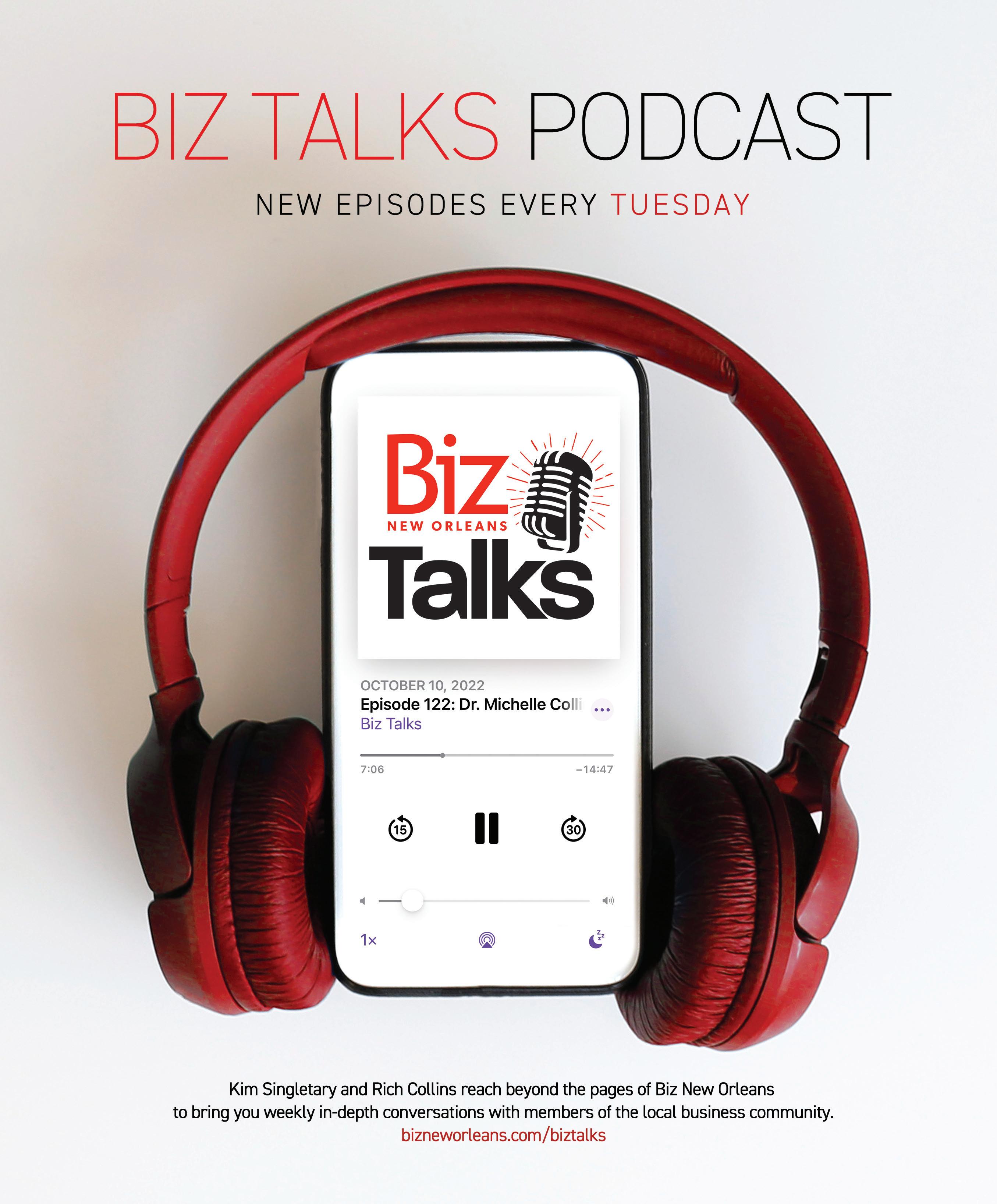
IN THE BIZ
26
20 DINING
Two local restaurants transport the sights, smells and flavors of Africa to the Crescent City
22 TOURISM
French Quarter Festival celebrates 40 years and a focus on sustainability
24 SPORTS
Thoughts on Payton’s return as head coach of the Broncos
ENTREPRENEUR
Tips on dealing with continued supply chain issues

POPPY TOOKER has spent her life devoted to the cultural essence that food brings to Louisiana, a topic she explores weekly on her NPR-affiliated radio show, Louisiana Eats! From farmers markets to the homes and restaurants where our culinary traditions are revered and renewed, Poppy lends the voice of an insider to interested readers everywhere.

Out of Africa
Two local restaurants transport the sights, smells and flavors of Africa to the Crescent City
BY POPPY TOOKER
When he traveled back to Senegal to explore his culinary roots, a chance meeting on the return trip changed Mbaye’s life forever.
While waiting at the airport, he met Cliff Hall of New Orleans Fish House. After hearing Mbaye’s story, Hall insisted, “You have to come to New Orleans!” He facilitated a job for Mbaye at Commander’s Palace, where Mbaye rapidly rose to sous chef.
Mbaye marveled at the deep cultural similarities between Creole and Senegalese food.
“The dishes that you eat here, we also have in Africa,” he exclaimed. “We have an okra soup, soupoukandia, that’s much like gumbo. You have jambalaya and we eat jollof rice. Our puffpuffs are just like beignets.”
Determined to share those close cultural ties, Mbaye began hosting pop-up dinners, and fate intervened again.
“I had never seen African food paired with wine,” Effie Richardson remembered. “I was shocked by his skill, level of prep and intense work ethic. I saw the way his food brought joy.”
tiny space on Broad Street. When the pandemic shutdown occurred, they resolved to quarantine together there, one of the city’s first to convert to takeout.
“We continued cooking, serving our food to hospital workers, fellow restaurateurs, anyone who made their way to our door,” Prince Lobo said. They made many fans in the process.
Today, those efforts are richly rewarded at Addis NOLA’s new home on Bayou Road. With almost twice the space, the restaurant features an authentic Gojobet, a thatched roof traditional dwelling outfitted with red velvet seats. There is a handwashing station in the dining room, as Ethiopian food is meant to be eaten entirely by hand with injera, a soft, spongy flatbread used as an edible utensil. A full cocktail bar includes specialty drinks like the Woo, a gin martini that features Tej, an ancient Ethiopian honey wine that Prince makes himself.
If you’ve caught a spicy, exotic scent wafting in New Orleans’ air, it could be a harbinger of a culinary trip to Africa. Today, it’s possible to explore the diverse flavors of that far away continent without ever leaving home.
Dakar NOLA’s Chef Serigne Mbaye’s story borders on mythical. Born in Harlem, as a child he endured almost 10 years of abuse and starvation at a Senegalese boarding school before returning to New York City for high school. Alone there, Mbaye worked two dishwashing jobs to survive before graduating with honors. In those restaurant kitchens he discovered a passion for food.
Taking a break from her pediatric dentistry practice, Richardson began working with Mbaye, and 14 months later, they opened Dakar NOLA on Magazine Street. There, guests experience Mbaye’s modern take on Senegalese cuisine expressed through a sevencourse meal in an exquisite setting that celebrates West African culture.
Across town on Bayou Road, Prince Lobo and his family share another side of Africa’s culture. Prince’s mother, Ethiopian-born Dr. Biruk Alemayehu was a Southern University professor and father, Jaimito Lobo, worked in virology until Alemayehu called the family together at Christmas in 2018.
“No one is presenting Ethiopian food to New Orleans. If we don’t, who will?” she declared.
Despite having no previous restaurant experience, four months later, the family opened Addis NOLA in a
“This sparkling gold elixir was the original wine of the world. It’s like a delightful dessert wine with the strength of a bourbon,” Prince Lobo proclaimed.
Coffee culture is such a vital part of Ethiopia, people gather at least three times a day to share the rich, hot brew. The Addis NOLA experience now includes a traditional coffee ceremony with green coffee beans roasted onstage before passing through the dining room, scenting the air.
In 2020, when times were tough on Broad Street, Prince Lobo would spontaneously shout, “Addis NOLA! Wooooo!” You’ll hear that impromptu call now on Bayou Road. He explained, “The woo is an open declaration to the universe that our family is here to feed and nurture the people any way we can.”
With such authentic experiences now available, New Orleans’ African connection is stronger than ever. Take your tastebuds on a journey there soon. T
20 BIZ NEW ORLEANS MARCH 23
IN THE BIZ DINING
ILLUSTRATION BY PADDY MILLS
Catch Poppy Tooker on her radio show, “Louisiana Eats!” Saturdays at 3 p.m. and Mondays at 8 p.m. on WWNO 89.9 FM.



21 BIZNEWORLEANS.COM
Big Shoes, Small(er) Footprint
French Quarter Festival celebrates 40 years and a focus on sustainability
BY JENNIFER GIBSON SCHECTER
for our fans, we are even more excited to offer an authentic and memorable experience April 13-16, we invite the whole family to help us make history for our 40th-year milestone.”
After several years of cancelations due to the COVID-19 pandemic, French Quarter Festival was able to return last year.
“Continuing the amazing comeback year we had in 2022, I am excited for the return of this year’s landmark 40th Anniversary of French Quarter Festival, which continues to be the largest showcase of Louisiana music in the world,” said New Orleans Mayor LaToya Cantrell in a statement.
French Quarter Festival (FQF) reported pre-pandemic numbers with more than 825,000 people attending in 2022. During the last occurrence of the festival before the pandemic, in 2019, The University of New Orleans Hospitality Research Center conducted a study of festivalgoers and found that 825,000 attendees lead to FQF generating a total economic impact of $190 million and nearly $15 million in tax revenue for state and local governments.
These numbers were accomplished via several strategies, deploying over 200 volunteers and staff, as well as working in collaboration with local organizations. Festival organizers placed 130 reusable waste bins throughout the four major festival sites. Educational signage and volunteers helped attendees understand how to properly dispose of their waste. Each of the 55 food vendors were required to use only compostable serving materials — Styrofoam was prohibited. With these measures, 18 tons of compostable waste was diverted to The Composting Network to make garden soil; 15 tons of plastic, aluminum and paper were recycled via Waste Connections; and 5 tons of glass was diverted to Glass Half Full, which used the glass to make sandbags for coastal storm defense. Additionally, 1,000 pounds of 2022 FQF signage was repurposed for student projects, Mardi Gras floats or stored to be reused this year.
One of the benefits of aging is the wisdom that comes from experience. French Quarter Festival presented by Chevron is celebrating its 40th anniversary this year, returning April 13-16, with more than 60 local restaurant food vendors, over 270 performances on 20 stages spread over four days and its renewed commitment to a more sustainable festival with the return of its Geauxing Green Initiative.
“It is an honor to be a part of such a wonderful organization that has stood the test of time,” said Emily Madero, president and CEO of French Quarter Festival Inc. (FQFI), the nonprofit organization that operates the festival. “FQFI is proud to say we have stayed committed to our mission for four decades, providing a platform for local artists, chefs and restaurants to showcase their talents. And

With the benefits of cultural celebrations and economic vitality, the flipside of mass amounts of people needs to be considered as well. Festival organizers understand firsthand the amount of debris that is created by their events ,and FQFI strives to be a leader in sustainable festival production in the Gulf South.
In 2021, FQFI partnered with the Barataria-Terrebonne National Estuary Program (BTNEP) to launch the Geauxing Green Initiative, aiming to reduce the negative environmental impacts festivals can cause. The initiative focuses on marine debris prevention by allowing only reusable, recyclable and compostable food and drink products at the festival.
The program was implemented into the 2022 FQF with tremendous results. Organizers reported they increased overall waste diversion by more than 25% in comparison to the 2019 festival (pre-initiative) with the addition of composting, glass recycling, donations and upcycling. Their recycling efforts captured 30,000 pounds of recycled waste, a 119% increase from 2019 with 13,500 pounds.
Andrew Woodruff, FQFI Director of Operations, has two decades in festival experience and more than 10 years of experience in agriculture and farming. In response to 2022’s success, he said, “As a major outdoor event that is working to be a leader in sustainable festival production in the South, we are incredibly proud of our efforts. We hope that our program can be seen as a tool for education around the importance of marine debris prevention and make greater impacts on our local community and the Gulf South region. The information learned and used at our festival can be applied throughout the year, whether out enjoying an event or at home.”
In addition to French Quarter Festival, FQFI operates Satchmo Summer Fest and Holidays New Orleans Style. It has successfully implemented the Geauxing Green Initiative across its events. For those interested in volunteering as part of the Green Team Crew, the registration portal is planned to open March 1, or you can email questions to volunteers@fqfi.org.
For general information about French Quarter Festival, including special events, the artist lineup and food vendors, visit frenchquarterfest.org. T
22 BIZ NEW ORLEANS MARCH 23
IN THE BIZ TOURISM
JENNIFER GIBSON SCHECTER was once a tourist in New Orleans herself and is now proud to call NOLA home.
ILLUSTRATION BY PADDY MILLS

CHRIS PRICE is an award-winning journalist and public relations principal. When he’s not writing, he’s avid about music, the outdoors, and Saints, Ole Miss and Chelsea football.

Black and Gold to Orange and Navy
Thoughts on Payton’s return as head coach of the Broncos
BY CHRIS PRICE
Somewhere in a box of memories, I have a photo from Nov. 27, 1983 — the day I was lucky enough to attend the Saints’ season closer and see my hero, Archie Manning.
By this time Archie was no longer wearing black and gold — he had been playing for the Minnesota Vikings since three games into the 1983 season. He was still my hero, though.
Sitting low in the plaza on the visitors’ side, I saw him pacing the sideline behind the bench and yelled out, “Hey, Archie!” He turned, and I snapped the shutter button. When the image was developed, it showed Archie, shoulders slumped and a defeated look on his face. He didn’t end up playing in the game, which would be his last in New Orleans, and he retired after playing in just four games in 1984.
I tell that story because another Saints hero, arguably the next in line to Drew Brees, the greatest Saint of all time, will eventually return to the Superdome wearing navy and orange rather than black and gold.
It won’t happen until the 2024 season, but Sean Payton, the winningest head coach in Saints’ franchise history, will return to New
Orleans as the head coach of the Denver Broncos.
After a surprise retirement weeks after the 2021 season, Payton agreed to return to the sidelines in Denver after working as an analyst on one of FOX’s NFL pregame shows in 2022.
He signed a five-year contract at the beginning of last month, and will seek to rebuild one of the league’s elite franchises into one of the league’s elite teams.
Payton, of course spent 15 years as the Saints’ head coach, and completely transformed the franchise into one of the NFL’s winningest teams during his tenure. After a 3–13 season in 2005, he came to New Orleans in 2006 in the wake of Hurricane Katrina, recruited Drew Brees to be his field general, led the Saints to their first NFC championship and was named NFL Coach of the Year.
In 16 seasons with the Saints, Payton led the team to an overall record of 161–97, three NFC championship games (2006, 2009 and 2018), nine playoff berths and seven NFC South division titles.
Though he retired, Payton had signed a fiveyear contract extension with the Saints in 2019, meaning New Orleans held his rights through 2024. That meant in order to hire him, the
Broncos had to get permission from the Saints to not only hire him, but interview him.
The teams agreed to terms including that the Saints are to receive Denver’s 2023 firstround pick — 29th overall — and 2024 secondround pick in exchange for the Broncos’ ability to hire Payton and gain the Saints’ third-round pick in 2024.
The addition of the first-round pick, although late, could be pivotal for the Saints in 2023 and beyond. Before trading Payton, the team didn’t have a first-round pick in 2023. With questions up and down the roster, being millions over the salary cap (again!), and the reshuffling of the coaching staff, Dennis Allen will have a lot of pressure to reverse the team’s fortune. Having that pick may well extend his tenure in the Crescent City.
There will be a lot of football to play until Payton leads the Broncos into New Orleans. The 2024 schedule won’t be determined until the end of the coming season. When the two teams do meet on the battlefront, I suspect it will be a prime-time affair. At some point in the game, I’m sure a camera will catch Coach Payton, in his signature look, with his lips semi-puckered, looking up into the rafters reflecting on his time in New Orleans.
When it comes, I’ll think back to my photo of Archie.
Sure, there will always be a little wish that he was still our head coach — and there’s no guarantee he’ll find success in the Mile-High City. He made the decision to step away from the team he transformed into a perennial contender. There may be some saltiness that he left, and as a result, the team didn’t look so good without him. But Payton gave his best to the Saints. He lifted the team, and by extension the city, when both were at their lowest. He’ll always be a hero here.
That being said, nothing would be more satisfying than the Saints returning to their winning ways over this season and next and punctuating Payton’s return to the Big Easy with the Saints handing him a big L. T
24 BIZ NEW ORLEANS MARCH 23
IN THE
SPORTS
BIZ
ILLUSTRATION BY PADDY MILLS

Supplies, Demand and a Bottle of Aspirin
Tips on dealing with continued supply chain issues
BY KEITH TWITCHELL
KEITH TWITCHELL spent 16 years running his own business before becoming president of the Committee for a Better New Orleans. He has observed, supported and participated in entrepreneurial ventures at the street, neighborhood, nonprofit, micro- and macro-business levels.

While the worst of pandemic-induced supply chain issues seem to be behind us, the situation remains challenging for businesses large and small, old and new. It is probable that timely and affordable access to supplies will remain a substantial headache for entrepreneurs far into the future.
Some of this is fallout from the pandemic. Wholesalers and warehousers are less inclined
to keep large inventories on hand, in part due to more fluctuations in consumer and thus retailer demand. Worker shortages impact manufacturers, shippers, warehousers and everyone else in the supply chain just as much as they do at the retail end. Many manufacturers are facing their own supply problems.
To this mix, add increasing weather impacts, international trade tensions and the war in Ukraine, among other factors, and the supply chain situation looks like a serious horror show. But dealing with it is unavoidable, so what are the best options for business owners?
“The key word is flexibility,” stated Ed Webb, former CEO of the World Trade Center in New Orleans. “Talk to your suppliers and see how flexible they are, in terms of the timing and quantity of supply delivery. Make sure you negotiate your terms on the front end and see if slower payment terms might be available. Most suppliers realize that if they don’t work with their clients, they will be out of business next year.”
In addition, added Webb, “this might be a smart time to look at your product mix, do some shopping, see if you can get new suppliers and better prices.”
Supply chain issues are particularly acute for smaller and newer businesses, according to Dr. Cheryl McCloud, who teaches supply chain management at the American Military University.
“Larger firms tend to control everything from supply chains to communications technologies,” she observed. “Small businesses have always had to connect through whatever mechanism is available to them.”
In this context, McCloud recommends that small businesses team up with each other, “and possibly with larger businesses. This will create economies of scale, and possibly even provide access to newer technologies.”
Webb suggested that going local is another potential recourse.
“Any time you can find a local supplier or a regional supplier that’s competitive, you should look into it,” he commented, pointing out that this approach can help alleviate everything from transit issues to weather disruptions.
That said, even smaller local businesses often draw on global suppliers to meet their needs. The Far East remains a top producer of goods and raw materials; however, especially in the case of China, this region is becoming ever less reliable as a source.
Raine Mahdi, founder and CEO of online trade broker Zipfox, suggests an alternative.
“Mexico is much closer to home,” he pointed out. “There are no tariffs, shipping takes much less time, no political tensions between our countries. They are even in similar time zones.”
Mahdi was himself importing supplies from China but found it increasingly untenable. “Mexico seemed like the most obvious place to look, but there was no structure. Even if I found what I needed, I didn’t know how to engage.”
This led him to create Zipfox, which essentially serves as an online trade broker between Mexican and American businesses. All Mexican suppliers are thoroughly vetted before being included, and the company provides comprehensive payment protection. American businesses can use the platform to contact suppliers directly, negotiating terms, shipping and all other details themselves.
“You may never actually need to talk to Zipfox,” said Mahdi.
While supply chain headaches may be a permanent reality, businesses can find ways to minimize them.
“Be realistic, be flexible, be resilient, do your homework,” he said. “Come up with a Plan B and a Plan C. But if you don’t do the work now, it could come back to haunt you later.”
26 BIZ NEW ORLEANS MARCH 23
IN THE BIZ ENTREPRENEUR
T ILLUSTRATION BY PADDY MILLS


27 BIZNEWORLEANS.COM

PERSPECTIVES
What
What’s
Racial and social disparities in healthcare are a deadly fact in the U.S., but local healthcare systems and practitioners are finding ways to make changes for the better.

REAL ESTATE+ CONSTRUCTION
30
BANKING+FINANCE
upcoming projects are you most excited about? 32
ECONOMIC DEVELOPMENT
What happens to a bank in a natural disaster? 40 GUEST Tax time is prime time for scammers. Here’s what to look out for. 38
34 HEALTHCARE
new at NOEW
TRAVIS C BANKS
Project Manager
Gravel Road Builders & Construction Services
LOUIS LAURICELLA

Managing Member
Lauricella
Land Company, LLC
Naturally, I’m excited about the River District and we anticipate making several major announcements in 1Q 2023. Also, we look forward to continued progress at Elmwood Center by breaking ground in 2023 with our first residential project and introducing several new and exciting retail/ restaurant tenants.
IAM TUCKER
President
ILSI
I’m excited about the green infrastructure projects that are coming to the area. Those projects are supposed to capture, hold and infiltrate hundreds of thousand gallons of storm and rainwater back into the soil. They will address the flooding and drainage problems in New Orleans.
We will begin construction on two projects in the first quarter of 2023. The first is called Two Saints, which focuses on co-living and will have a 25,000-squarefoot indoor entertainment tenant on the ground floor. And on the first floor of The Garage, we are developing a 42-room boutique hotel with an ancillary bar and restaurant. We will call it Hotel Bonsai. Finally, in Lafayette, we have begun the design phase of the Trappey Riverfront District, a mixed-use development on the Vermilion River adjacent to the Evangeline Thruway.
SAMANTHA JOHNSON
Design Studio Manager


NANO Architecture | Interiors
The Dead Rabbit at 616 Conti in the French Quarter will be the second location of the iconic bar and restaurant. Incorporating the recognizable features from its first location in the Financial District of Manhattan, this location will naturally inherit new styles inspired by the surrounding French Quarter neighborhood.
BRAD MCWHIRTER
Partner
Trahan Architects
ROBERT WOLFE
President
Robert Wolfe Construction
and CEO
 Engineering
Engineering
We are a proud partner on the AECOM/Hunt/ Broadmoor Construction Manager At Risk (CMAR) team for the renovations at Morial Convention Center of New Orleans (MCCNO).
We are happy to expand our capabilities in Building Information Modeling (BIM) under the mentoring of our prime contractor. This will be a transformational update of the building, and we are so excited to be a part of such an enormous opportunity!
Marcel Wisznia, President, Wisznia|Architecture + Development



Two projects come to mind: one in Central City in New Orleans and one in Gretna on the Westbank. In Central City, we have New Hope Baptist Church’s Community Center, a 15,900-square-foot new build which includes a gym to serve at-risk youth. In Gretna, we have Café Hope’s renovation of Timberlane Country Club’s Restaurant, Clubhouse and Ballroom, a 23,250-square-foot renovation in the newly formed cultural historic district, which will benefit Café Hope’s culinary arts program that helps at-risk youth. It’s unique that both projects have “hope” in the client’s name and they are working in an area that has so much need. Something to give us all hope for our youth in 2023 and beyond!
Trahan Architects is excited about the Superdome’s complete transformation of the patron circulation experience vertically and horizontally throughout the building. In the past, the incredible volume of the Superdome interior was shielded from patrons until they entered the main arena through the vomitories. Visitors experienced low floor-to-floor heights and tight concourses from the entrance to the seats. The new design carves three large corners and two large sideline atrium voids vertically through all levels to create enhanced pathways for new escalators and elevators, allowing patrons to move quickly through the building to new amenities.
30 BIZ NEW ORLEANS MARCH 23
PERSPECTIVES REAL ESTATE + CONSTRUCTION
What upcoming projects are you most excited about?



31 BIZNEWORLEANS.COM
What Happens to a Bank in a Natural Disaster?
BY DREW HAWKINS
At the end of last year, the Federal Reserve announced that six of the country’s largest banks — JPMorgan Chase, Bank of America, Citi, Wells Fargo, Goldman Sachs and Morgan Stanley — would participate in a “pilot climate scenario analysis” designed to test the resilience of banks in a variety of potential climate change outcomes. As natural disasters like severe hurricanes, wildfires, and droughts become more intense and common, The U.S. central bank is looking for data on how these businesses are prepared for the risks posed by global warming.
This climate analysis is different than the usual “stress tests” the Fed periodically conducts to determine whether banks have enough capital to cover losses associated with major economic shocks, like a recession. Here, the analysis doesn’t have any implications or penalties for the banks, it’s just to explore the possibilities.

However, given that climate change has also become a political issue, the pilot climate scenarios represent a big move into contested territory, with
some members of Congress, mostly Republicans, pushing back against the Fed potentially making climate-related policies. Some local banks have also expressed concern about the future implications of the analysis.
“One of the problems with big bank tests is anything that regulators do to the big banks, they ultimately push down to the community banks,” said Guy Williams, CEO of Gulf Coast Bank and Trust. “And they always start by saying, ‘This doesn’t apply to you.’ But then it becomes a best practice. And then in the examinations, they start saying, ‘Well, why aren’t you doing this? It’s a best practice.’”
Williams fears regulations arising from the climate scenario analysis could impact people who live in areas at greater risk of the effects of climate change — namely, coastal Louisiana. “If the regulators push the big banks away from investing in any of the coastal parishes, ultimately, they’ll do the same to us,” he said. “And that would be very dangerous for South Louisiana.”
It’s normal for the Fed and financial institutions to evaluate and form strategic plans, Williams said, and while he “appreciates the Fed’s help,” he doesn’t think analysis will discover anything that local banks in South Louisiana don’t already know.

“Community banks already have a lot of experience in dealing with climate change, and we call it preparing for hurricanes,” Williams said. “We know how to do resilience. We know how to do disaster recovery. And we encourage our customers to consider those things as well when they build new buildings, to build them to current hurricane standards.”
Still, any new regulations that might arise from the analysis are far from the minds of local bankers, who have far more pressing and immediate concerns.
“We’re a community bank serving small businesses, so we’re really focused on their needs and the risks associated with them,” said John Zollinger, executive vice president and chief banking officer at Home Bank. “I’m much more concerned about inflation, workforce, all those kinds of things, because it affects me today, and it is affecting our clients greatly.”
Still, Zollinger is paying attention to the Fed’s pilot climate scenario analysis to see what rules will be handed down.
“If they start requiring us to do more in this space,” he said, “then we’ll be doing it.”T
JOHN ZOLLINGER Executive Vice President and Chief Banking Officer Home Bank
Existential risks are things that are going to affect everybody and anybody. Those are the kinds of things that get baked into what we do in general, not what we do for you as a business owner trying to make sure that you have your business properly financed, your capital structured on the right thing, that you’re optimizing what you do. That’s where we come into play as financial advisors.
GUY WILLIAMS CEO Gulf Coast Bank and Trust
I think you have to look at the intersection of science and politics. There are people that politically would like to say just no more building on the coast, no more building in flood-prone areas. I’m a little apprehensive that they’re not actually going to learn anything new, but that this is an attempt to push people away from investing in areas where people want to live.
32 BIZ NEW ORLEANS MARCH 23
PERSPECTIVES BANKING+FINANCE
It’s a question that some of the nation’s largest financial institutions are trying to answer



33 BIZNEWORLEANS.COM
PERSPECTIVES
HEALTHCARE
BATTLING HEALTH INEQUITY

DID YOU KNOW? Life expectancy rates between citizens of traditionally underserved areas and citizens of more affluent areas of New Orleans can differ by as much as 26 years.
There’s a reason why heads of state and the world’s wealthy elite come to this country for medical care. The United States is unparalleled when it comes to medical research and innovation. More Americans have received the Nobel Prize in medicine than Europe, Canada, Japan and Australia combined — despite their combined populations being more than double that of the U.S.
However, there’s a tale of two cities here. If you aren’t a world leader or a billionaire, consistent and quality medical care may be difficult for you to access in this country — and specifically, in this city.
The U.S. has one of the lowest life expectancies of high-income countries. Switzerland averages 83.2 years, while Americans average 77.3 — New Orleanians average 76.6 years. Studies show that more than a quarter of Americans — 27.2% of adults — suffer from a chronic condition. In New Orleans, four in 10, 41% of adults, have a chronic medical condition.
Those staggering statistics don’t mean Americans in general or New Orleanians specifically are more prone to disease or are necessarily unhealthier than people in other countries. Sure, we like to laissez le bon temps rouler and enjoy good, rich food, but these disparities illustrate that our healthcare system isn’t equitable. It isn’t fair.
And while these inequalities are distributed along income lines, they’re also deeply rooted in historical, racial divisions and biases that persist to this day.
“Healthcare in New Orleans, like the rest of America, is profoundly inequitable,” said Dr. Jennifer Avegno, director of the New Orleans Health Department. “People of color historically suffer higher rates of chronic and preventable disease, increased morbidity and lower average life expectancies.”
BY DREW HAWKINS
Avegno attributes these outcomes to generations of structural racism within healthcare systems and institutions, as well as economic and social inequities creating significant gaps in health determinants. She said a deliberate focus on dismantling health inequities at every step of care is critical to ensuring all New Orleanians have the chance to live long, healthy lives.
34 BIZ NEW ORLEANS MARCH 23
Racial and social disparities in healthcare are a deadly fact in the U.S., but local healthcare systems and practitioners are finding ways to make changes for the better.

The science is also clear on this. Louisiana has the second highest rate of new cancer cases in the country, due in large part to the interaction between pollution and poverty.
“There is an absolute link between access to healthcare and cancer rates,” said Dr. Joe Ramos, director and CEO of Louisiana Cancer Research Center. “African Americans have the highest overall cancer mortality of any racial or ethnic group in Louisiana. Black women develop more new cases of triple negative breast cancer. The rates of prostate, cervical and colorectal cancer exceed that of the white population in Louisiana.”
In recent years, there has been a greater emphasis placed on health equity, likely driven by the problem receiving more exposure.
“As racial and social disparities in care have become better documented, and therefore undeniable, many healthcare organizations have implemented programs and processes to stimulate progress in this area,” said Dr. Mary “Toni” Flowers, chief diversity and social responsibility officer at LCMC Health.
Flowers sees the creation of positions like her own in health system C-suites as a step forward. She said healthcare organizations are acknowledging the value of the work of health equity and are providing experienced supporting staff to implement work plans to address and reduce existing inequities.
She notes, however, that it will take more than new roles or new programs to solve the problem.
“The most effective healthcare organizations gain the full benefits of proficient health equity leadership by integrating the work into operational strategic plans,” she said, “and not isolation of these efforts to peripheral community-based programming.”
The challenges of identifying all the structural and institutional ways that inequality is built into every part of healthcare are very real. Avegno said health profession school curricula are slowly addressing core drivers of unequal outcomes as part of their required education, and many hospitals and clinical practices are initiating diversity, equity and inclusion (DEI) initiatives to identify and break down barriers to appropriate care.
Without a sustained focus on the social determinants of health — like education, income, housing gaps and others at a broader level — however, progress will be limited.
One of the more direct, tangible ways inequity in healthcare is being addressed is through improving access to and with innovative medical technology.
That includes large-scale analysis that can take the form of diversity and disparities dashboards that track disaggregated patient and employee data to identify and track patterns, trends and themes related to equitable experiences.
Using data to define problems and solutions is essential.
“There’s the old adage that you can’t fix what you can’t measure,” said Dr. Stephen Hales, secretary-treasurer at LCMC Health and past board chair at Children’s Hospital. “Sharing information allows collaboration in improving access and outcomes. Effective use of data lets us understand which strategies are most effective and gives us the tools we need to focus on preventive care rather than treating preventable conditions. Ultimately, that should be our goal.”
Health tech has traditionally been the privilege of the privately insured — services like telemedicine visits, remote monitoring systems, or assistive technologies to improve quality of life. By allowing Medicaid beneficiaries to access these programs — by making them reimbursable at a competitive rate, for example — the health tech gap could be bridged.
There are some early signs of this. An Ochsner pilot program using remote monitoring of Medicaid patients, for example, has shown real success, and some innovative health tech startups in the area, like TechPlug, are actively working to bridge the digital divide for underserved, vulnerable populations.
There’s also work being done by individual providers — the doctors and specialists who work with patients from marginalized communities.
“We’re seeing providers turn to subscription business models and create technologies that don’t require payment or approval from health insurances,” said Dr. Lana Joseph-Ford, founder and CEO of High Level Speech and Hearing Center. Ford said she’s started offering payment plans as a more “patient-centric approach” that makes it possible for people to access treatment they may not have otherwise been able to receive.
The bottom line is health equity won’t be achieved by one single solution. Health experts say it will take deliberate focus, painful reckoning, and a tremendous amount of work by everyone in the medical system and beyond to build a future where an individual’s race or ethnicity does not significantly determine their lifespan or likelihood of chronic disease.
For Avegno, the words attributed to Martin Luther King, Jr., say it best: “Of all the forms of inequality, injustice in health care is the most shocking and inhumane.”T
36 BIZ NEW ORLEANS MARCH 23
“
”
It’s important for the public to be aware that up to 80% of an individual’s health outcomes are determined not by their particular anatomy or family history, but by the economic and social determinants that shape their upbringing and lives from the earliest moments. People of color do not die earlier of chronic diseases because of “family history,” but because of repeated exposures to inequitable conditions — often for generations.
Dr.
Jennifer Avegno, director
of the New Orleans Health Department
New Orleans 500 Influential, Involved and Inspiring Executives
The New Orleans 500, an annual publication from Biz New Orleans magazine, profiles the business leaders who are driving the greater New Orleans economy today and making decisions that will shape the region’s future. The book is overflowing with details about regional CEOs, presidents, managing partners, entrepreneurs and other executives who are as devoted to their professions as they are to civic affairs. It’s a diverse group that includes fourth- and fifth-generation owners of family businesses as well as young, social media-savvy entrepreneurs building their brands one like or follow at a time.

ORDER TODAY BIZNEWORLEANS.COM
2023 EDITION
PERSPECTIVE ECONOMIC DEVELOPMENT
What’s New at NOEW?

Lots. Including a whole new festival vibe.
BY LIZ MAXWELL
way that only New Orleans can host. Across six days, eight themes will shape the conversation around what’s trending in leading industries across the Gulf South.
NOEW 2023, presented by JPMorgan Chase, includes new aspects that we hope inspire our loyal crowd, while inviting in fresh ideas, collaborations and partners. In 2023, NOEW will lean into the New Orleans “festival” vibe to showcase New Orleans’ authentic culture and celebrate the creativity it takes to lead in startups, entrepreneurship and innovation. This includes the new “NOEW Fest,” a backto-back lineup of cutting-edge music artists inside the main event.
Since the first NOEW was created by The Idea Village in 2011, it has been a premier platform for entrepreneurs, startup founders, industry experts, investors and business-minded creatives to connect and network, exchange ideas and get inspired. If you’re a longtime fan of NOEW, you can count on another year of the best and brightest minds in entrepreneurship and innovation presenting live and in-person.
For the first time, we’re introducing paid tickets to NOEW — the $99 NOEW Fest Pass and $250 NOEW VIP Pass. The majority of NOEW 2023 events, however, will remain free and open to the public. Thanks to our sponsors, we’re able to ensure that the networking, education and community generated through NOEW remain accessible to all.
Our 2023 speaker lineup is stellar. Mark your calendars now for Steve Case, founder of AOL and author of the new book Rise of the Rest for his discussion on how entrepreneurial communities are thriving across the U.S., including right here in New Orleans. Former U.S. Sen. Mary Landrieu will share her experience creating bipartisan solutions to climate challenges, while Taylor Griffin, former NBA player and head of athlete relations at a rising private equity firm, will share his thoughts on bringing more athletes into startup investing.
What happens when the innovation and entrepreneurial communities double down on food, music and culture?
Find out at New Orleans Entrepreneur Week (NOEW) 2023, which is back with a bang March 27-April 1. At this year’s NOEW, we’ll explore the intersection of innovation, culture, technology and business in a
National headliner speakers and local thought leaders will present across eight themes: Climate Tech, Culture Tech, Health Innovation, EATrepreneurs, SaaSy Entrepreneurs, Startups for Impact, Investing in Innovation and Future of Local Business. Thoughtfully developed by The Idea Village’s team in conversation with dozens of partners across the regional entrepreneurial ecosystem, these themes represent the industries and topics that are most resonant for the Greater New Orleans region and the areas where the Gulf South has a unique opportunity to lead.
NOEW Fest’s music lineup will keep us dancing late into the night and through Saturday, establishing NOEW as a weekend destination. Both EATrepreneurs and NOEW Fest musical acts will participate in panels during the day to discuss the relationship between culture, technology and innovation.
As is tradition, Friday is “Pitch Day” at NOEW. This event features multiple live pitch competitions and culminates in IDEApitch, where three top startups from The Idea Village’s VILLAGEx accelerator program compete for investment prizes.
We can’t wait to see you at NOEW 2023. Want a sneak peek of all that you can expect at NOEW 2023? Listen to The Idea Village’s new podcast, Big Easy Ideas, streaming now on all platforms. Visit bigeasyideas.com to listen.
Our vision for NOEW is to draw global professionals to learn, grow and connect at the intersection of innovation and culture, in a town that is never at risk of losing its soul. Like so many other great New Orleans festivals, we hope NOEW continues to grow and truly become a destination event for innovators, entrepreneurs, business leaders, startup founders and New Orleans lovers from around the globe. With the help of partners like New Orleans & Co., New Orleans Tourism & Cultural Fund, and dozens of others, we aim to put NOEW on the map as the innovation and cultural fest of the Southern U.S..T
38 BIZ NEW ORLEANS MARCH 23
LIZ MAXWELL is the executive producer of NOEW and director of community and communications for The Idea Village, the nonprofit business accelerator that produces New Orleans Entrepreneur Week.
ILLUSTRATION BY S.E. GEORGE
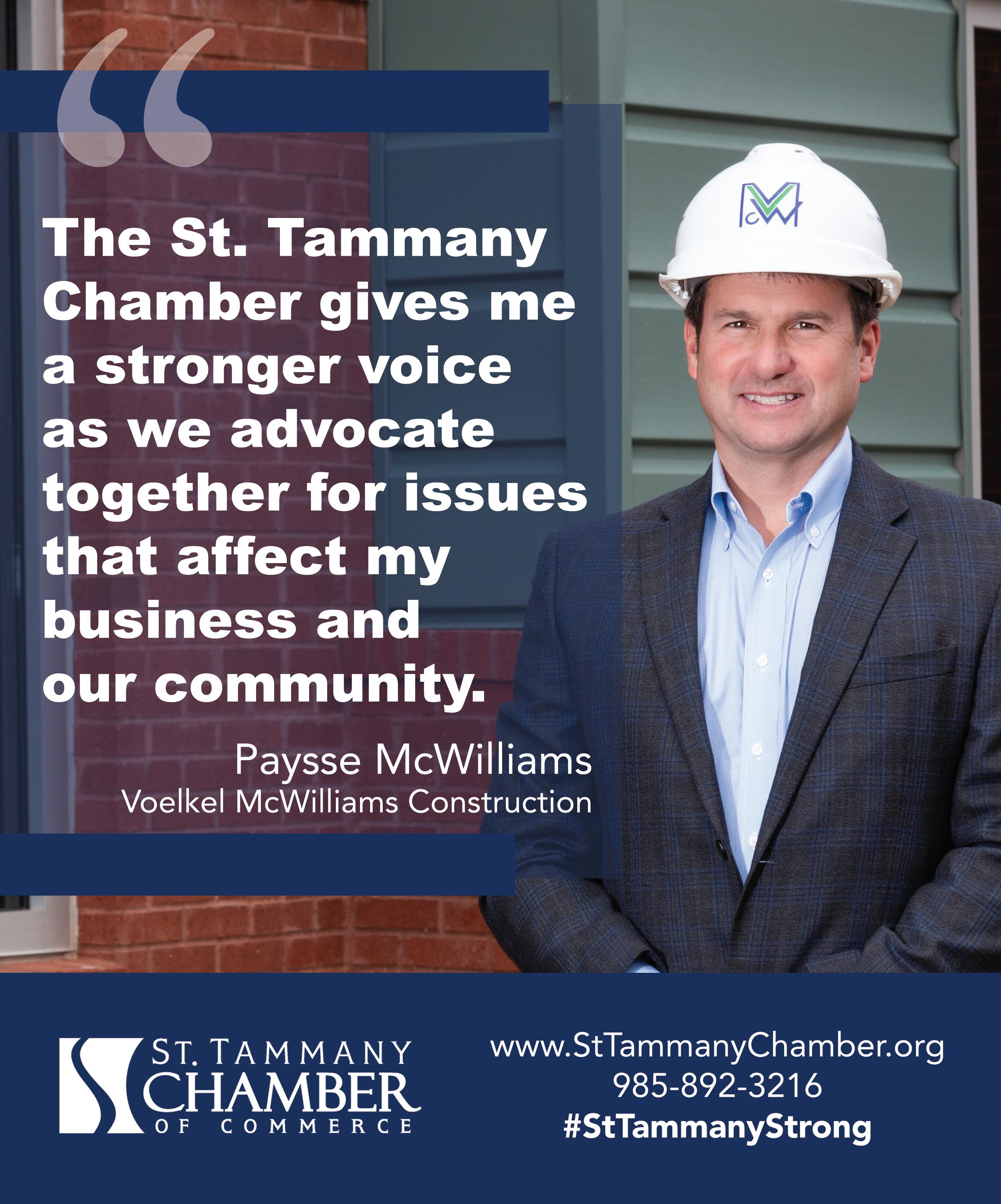
PERSPECTIVE
GUEST
FRANK TORO is a financial advisor at Edward Jones. He may be reached by calling (504) 341-9854 or by email at frank.toro@edwardjones.com.

Don’t Be a Victim at Tax Time
It’s prime time for scammers. Here’s what to look out for.
BY FRANK TORO
IRS that sounds bullying or overly inquisitive — and certainly don’t provide any personal or financial information.
Unfortunately, these fake messages aren’t the only tax season scams out there. You might even receive a direct deposit from what appears to be the U.S. Treasury Department — but if you weren’t expecting it, something’s likely not right. This payment could be a sign that a fraudulent tax return was filed in your name, and it might be followed by a communication from a supposed IRS agent requesting this overpayment be sent to them. If this happens to you, you’ll want to contact the IRS right away, and you could also ask your bank to return the deposit to the government.
This is the time of year when we’re all getting to work on our taxes, but it’s also the same time that tax scammers go to work. What scams should you be on the lookout for and how can you avoid being victimized?
Sadly, the list of scams is pretty long, including demands for payment or requests for “additional information” pertaining to your tax refund, in which the sender asks for your Social Security number and other personal information. These scam emails can look quite official, often incorporating the IRS logo. You might also receive scam text messages containing bogus links from the purported IRS website or an online “tool” that can help process your refund faster.
But keep these points in mind:
• The IRS generally won’t contact you by phone and won’t contact you by email, text messages or social media channels to ask for personal or financial information. The IRS begins most correspondence to taxpayers through regular mail delivered by the U.S. Postal Service.
• The IRS won’t call to demand you make an immediate payment through a prepaid debit card or wire transfer. If you owe taxes, the IRS generally will mail you a bill. The IRS also won’t threaten to bring in the police or another law enforcement group to arrest you for not paying your taxes.
In general, be extremely skeptical about any type of communication claiming to be from the
Yet other scams don’t claim to originate directly from the IRS. Instead, scammers pretend to be from real or imaginary tax organizations. For example, you could get a message from the Taxpayer Advocate Service. While this is a real, independent organization within the IRS, this agency won’t contact you without a legitimate reason. Or you could receive a message from the nonexistent “Bureau of Tax Enforcement.” Your best bet is to delete these messages immediately or send them to your spam folder.
Not all tax season scams originate from fraudulent IRS representatives or fake agencies. You also need to be careful about whom you hire to prepare your taxes. If possible, get a recommendation from a trusted friend or family member. Keep in mind that a legitimate tax preparer must have a valid Preparer Tax Identification Number and must sign your tax return. If someone doesn’t have this number or is reluctant to sign your return, it may well be a sign that this individual is a “ghost preparer” who only wants to pocket your fee.
Tax scammers are, unfortunately, here to stay, but remaining vigilant can help you keep them from causing problems for you this tax season. T
40 BIZ NEW ORLEANS MARCH 23
ILLUSTRATION BY S.E. GEORGE
 by Keith Twitchell
by Keith Twitchell
Kimberly Gramm shares the details behind Tulane University Innovation Institute’s new startup fund
A $10
Million
Boost for Entrepreneurism
photos by Greg Miles
Entrepreneurism
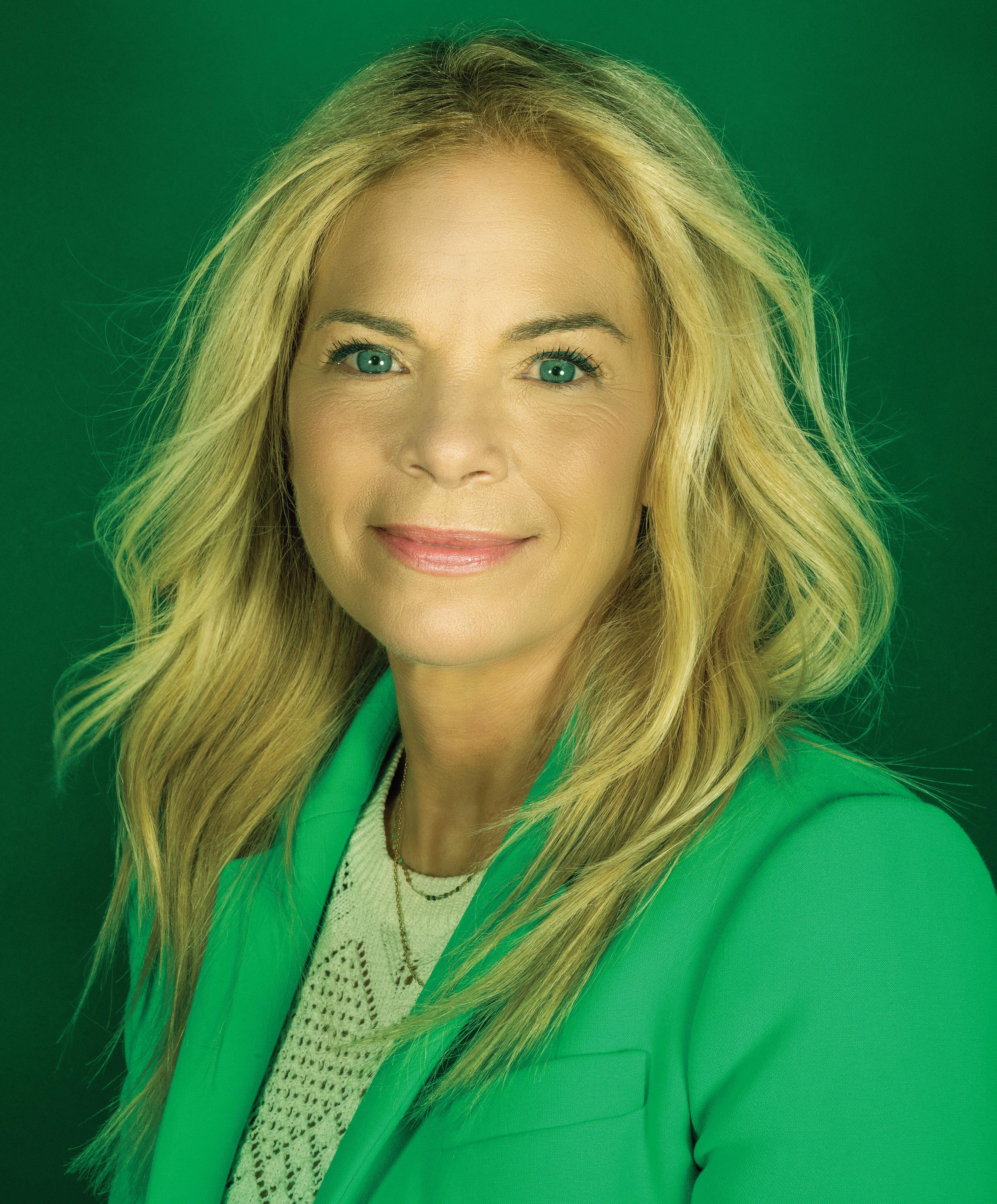
hile the New Orleans region has recently moved toward the forefront of entrepreneurism in the United States, its place there is not solidified. The city has a long history of being in a leadership position and then resting on its laurels while other cities leap ahead. To cite just two examples, New Orleans used to be the banking center of the South; and the airport used to be the primary gateway to South America.
Neither of these is remotely true today.
Among the vulnerabilities in our current entrepreneurial marketplace are access to capital, entrepreneurial support systems – especially pertaining to scaling up – and overall equitability. In general, the entrepreneurial ecosystem here needs a stronger institutional foundation.
Stepping up to meet this challenge is the new Tulane University Innovation Institute, which is charging right out of the gate with the launch of a $10 million startup fund which expects to begin accepting applications for funding from startups this spring.
“New Orleans is still an emerging entrepreneurial ecosystem,” observed Kimberly Gramm, chief innovation and entrepreneurship officer at Tulane. “The Innovation Institute is designed to convert university research and ideas into marketable products, services and startup ventures.”
Gramm said the institute consists of three basic pillars: commercializing the university’s own IP; supporting faculty and student entrepreneurship education and programs; and helping the broader New Orleans community of innovators realize their entrepreneurial goals.
To kickstart the third, outward-facing component, Tulane is establishing a Community Pillar program that will, in Gramm’s words, “connect, fuel and recharge community opportunities. This initiative will emphasize community engagement and will have the mandate to support current community programs that are successfully creating and tracking community startups, and/or provide a new opportunity to build community startups.”
Most impactful will be the $10 million startup fund, which will be accompanied by a variety of entrepreneurial support programs and services.
The focus will primarily be on ventures owned by women and people of color, given the tremendous lack of resources available to these types of businesses in the current investment world. Gramm cited recent research from the Greater New Orleans Startup Report — commissioned by Tulane’s Albert LePage Center for Entrepreneurship and Innovation — which found that women receive 2.3% of startup investment, and another 2022 study showing that only 1.87% of assets
under management was dedicated to DEI (diversity, equity and inclusion) investments.
In terms of sectors, companies that are technology-focused and/or technology enabled will be given priority, with a particular emphasis on startups in the fields of healthcare, AI and energy.
“Most of these ventures will be in their early stages,” noted Gramm, “and we want to get them the fundamentals they will need to succeed. This will include things like how to use QuickBooks, how to prepare financials and go-to-market strategies, and how to write competitive federal funding applications.”
One key component will be an expert mentor network, which Tulane will assemble by drawing on its own vast network of successful alumni.
“Mentors will have a wide variety of expertise and technical backgrounds,” Gramm elaborated. “They will help guide participants through the challenges they will have to overcome.”
Another existing Tulane resource that will support this work is the University’s Innovation Labs, which according to Gramm will explore “proof of concept funding for prototypes. We can translate technologies, tests the markets, see if customers really exist for these concepts.”
Program participants will also learn about business fundamentals such as marketing, public relations, social media, and general connectivity with the marketplace and with customers. In addition, they will come out of the program with access to additional local support and a broader network of contacts that can assist with links to manufacturers, shipping and other resources.
“The institute’s goal is to build startups that will be ready for funding,” explained Gramm. “We want to help a startup grow, increase its traction and valuation, and get it ready for larger Series A and B funding rounds.”
Integral to achieving this is the funding Tulane will provide for the program. Five million dollars of the initial amount comes from the U.S. Treasury’s State Small Business Credit Initiative (SSBCI), a program initially established in 2010 and expanded in the 2021 American Rescue Act. Tulane itself will put up the additional $5 million.
For local entrepreneurs seeking to tap into the program and funding, there is a formal application process that will open this spring. Gramm offered some guidelines for those considering applying.
“What we’re looking for is, ‘What problem are you solving?’ Is your technology solving this problem, and how? What is the market for your concept? What are your competitors doing or not doing? Describe your unique value proposition — it’s important to say how this differentiates you in the marketplace.”
On the business side, Gramm wants to know, “What are your plans for how to reach your customers? What are your future revenue growth plans, your plans for engaging customers? How will you make money — in plain, simple language, what is your business model? What is your road map for milestones?”
Gramm categorized the investments as “seed funding, which enables an early-stage company to finance some of its first steps, such as market research and product development, and enables a company to take its vision from idea to reality. Essentially it is equity-based funding, which requires inves-
W
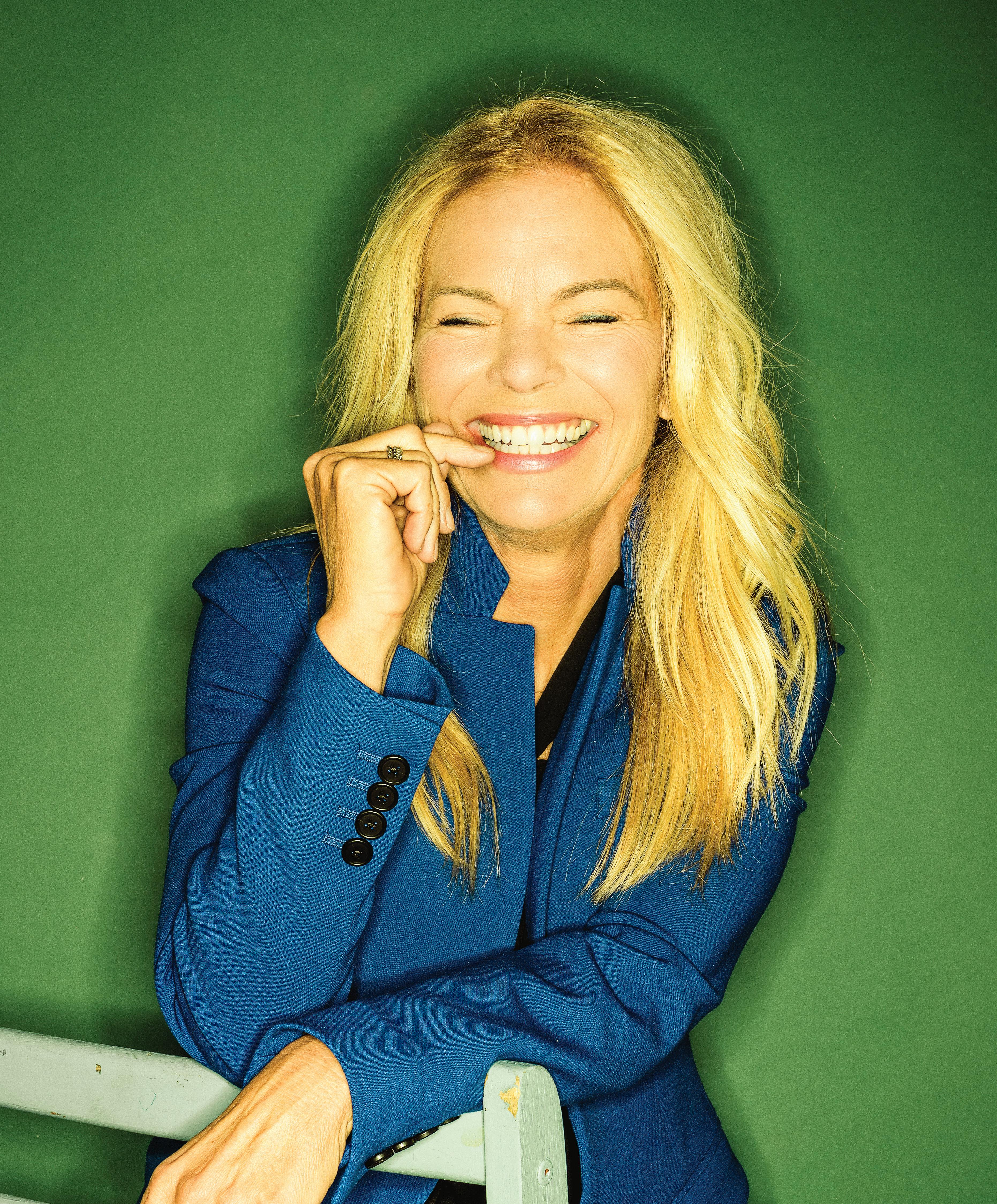
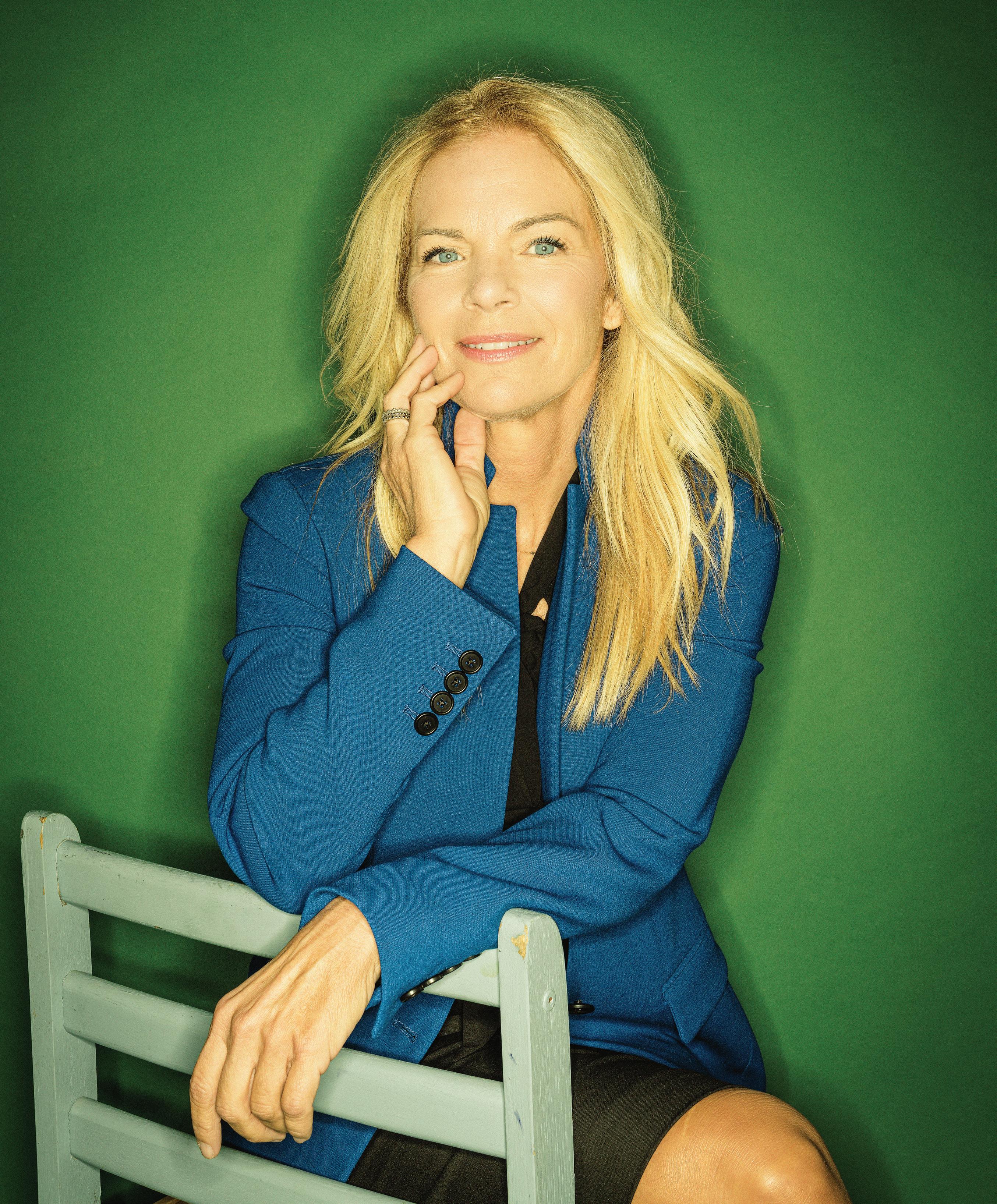
tors to invest money into the business at the very early stages. In return for the investment, the investor is given an equity stake in the company.”
Funding will be available in a range from $10,000 to $200,000, depending on the justification applicants provide for their funding needs and how they plan to use the investment dollars. The funding should become available by late spring.
Gramm hopes that going through the application process, and addressing these and other key entrepreneurial questions, will help business owners further clarify their own objectives and capacities.
“Not everybody is meant to be a founder, or can scale a business,” she pointed out. “Different-sized businesses have different problems, and people with ideas are not necessarily the people that can scale them. Everybody has their sweet spot of expertise, and some people may be best at ideas and innovation. It may be their baby, but they have to get comfortable with the handoff.”
Those who are accepted into the program will generally be early-stage startups, though a business that has been around for a few years but not yet raised Series A funding could be considered. The amount of time someone will remain in the program will depend on the type of startup and the type of technology it is working with, though the objective is to have the businesses ready for their next round of investment within a few years.
When participants do reach that stage, Tulane will assist with access to its networks and to outside investors locally and statewide. Along the way, the university hopes to realize some return on its investments in these businesses.
“In a perfect world, this becomes an evergreen fund,” said Gramm. “The investment returns can be used to continue supporting innovation.”
Gramm feels that Tulane is the ideal location for the Innovation Institute and this type of entrepreneurial programming.
“Tulane tends to be pro-innovation: I see innovation as our third university pillar, along with research and education,” she said. “We have a lot of infrastructure here to help us understand a lot more about the technologies being proposed.”
Indeed, existing university institutions such as the A.B. Freeman School of Business and the Albert LePage Center for Entrepreneurship and Innovation, along with contests such as the Novel Tech Challenge and the Business Model Competition, have already carved out a large role for Tulane in the entrepreneurial ecosystem. Gramm sees her initiative as complementary to, and expanding of, these ongoing efforts.
“We will not duplicate,” she stated. “We will leverage existing programs and fill in the gaps. We will engage and enhance and be additive, to create an innovation pipeline with the intent of managing our portfolio. The programs will be more integrated to ensure follow-through and success.”
The startup fund, however, is something new.
“This is our first venture fund, and it is still in the early stages,” explained Gramm. “We are in the process of forming the general partner and LLC entities, as well as developing a job description for the fund manager.”
While the specific source of the internal funds has not yet been determined, Gramm is certain of Tulane’s commitment to lining the monies up, and anticipates no real problems meeting that late spring timetable.
Gramm herself is new to Tulane, although she has been in the higher education world for 15 years. Prior to that, she worked at UPS, where she learned how to navigate and be effective in institutional environments — experience that has translated well into the university world.
“Institutions change over long periods of time, while innovation and entrepreneurs are juxtaposed to that,” she observed. “I became conscious about how to create environments that support the American dream in these settings and have focused my passion on how to create entrepreneurial environments.”
Her success in creating university-based incubators led her to Tulane and her newest challenge, which of course also comes in the context of the challenges of the Greater New Orleans region.
Gramm is ready to take these on as well.
“We have to nurture environments that people want to be in, innovators and investors,” she said, pointing out that every investment made in one place or in one company is an investment not made somewhere else. “We have to make it safe to fail, as well as to succeed. We have to nurture the spirit of innovation.
“Within this idea of being sustainable and competitive, we have to remember that we are competing in a global marketplace,” she continued. “What does that mean for us? In a university, we transfer knowledge to our students, but most of our students leave New Orleans. If startups and their founders are going to stay here, we have to have the things here that are going to nurture them, so they can build it here and stay here.”
The solution, Gramm believes, is found in the focus of the Innovation Institute, on lifting up the women, Black, Indigenous, and people of color in the entrepreneurial world that are so often ignored and under-resourced.
“We believe that ideas can come from anywhere,” she said, “and we have to provide opportunities for access to anyone with a good idea. We have to back our own local people.”
In her view, this is entirely doable. “We are in the right place at the right time with the right leadership. Many of our community and university leaders have made entrepreneurship a priority, and we are seeing more alignment with mobilizing resources. I know we have a lot of work to do, but every city has its challenges. I’m excited about the building blocks and momentum we have, and I feel we have a really great future ahead of us.
“We are the champions for the entrepreneurial ecosystem, providing the appropriate infrastructure, policy and investment capital,” she concluded. “We are going to institutionalize innovation and entrepreneurship.” T
Most of these ventures will be in their early stages, and we want to get them the fundamentals they will need to succeed. This will include things like how to use QuickBooks, how to prepare financials and go-to-market strategies, and how to write competitive federal funding applications.

When Off the Shelf Won’t Do
Have a problem that calls for a tailormade solution? It may be time to turn to custom software.
by Owen Racer illustration by Donough O’Malley
MetaClinic
The companies behind custom software are known for being able to produce a large quantity and high-quality of software with relatively few employees. While not always the case, the New Orleans-founded MetaClinic, with a staff of three, has certainly conquered this efficiency, reflected by their $40 million pre-revenue valuation in 2017.
Founded in 2015 by Brett Landrum — who also owns GatherMed, a company that provides remote patient monitoring for healthcare providers — MetaClinic’s software serves as a bridge between law firms and clinics, technical services and medical spaces, and doctors and their networks.
After growing from its original core focus of time billing, MetaClinic’s software aims to help clinics manage care and claims data by allowing them to collaborate with other clinics to share data on patients, and enabling clinics to keep intake, scheduling, billing and customer service departments in-sync. The software tracks everything on a patient, from care plans to account balances, as well as manages accounts receivables, requests patient records as needed, and allows patients to know what their insurance covers before treatment.
MetaClinic has many preexisting networks across cities. By allowing doctors to release their own care plan into Metaclinic’s network, the software expands the patient network of users.


Landrum spoke of being proud of New Orleans’s burgeoning technology marketplace.
“A lot of people don’t think of New Orleans as a tech hub of any kind, and they’re kind of right in that, but that doesn’t mean they aren’t here,” he said. “We can do anything in New Orleans that can be done on the West Coast.”
At its largest point, the fully remote staff once had 12 employees, which Landrum said is no longer necessary as
The last time you used POS technology, handled an automated invoice, or called on a delivery service, you most likely were interacting with a form of custom or specialized software. ¶ Although complex at times, custom software is more subtly embedded into our everyday lives than ever before, and some of the companies writing that software are based here in New Orleans.
50 BIZ NEW ORLEANS MARCH 23
the software has been adapted, meaning maintenance is the main focus.
“What one engineer can do now versus what they could do five years ago is like night and day,” Landrum said on his now smaller staff.
Antares Technology Solutions

New Orleans-based Antares Technology Solutions, formerly Cotinga Soft, is a software engineering company based on lower Magazine Street focused on building software “from the ground up,” according to President and CEO Barrett Conrad. With custom builds across all industries — including banking and medical — Antares typically builds software with web applications, server-side technologies (think, data-based management systems) and mobile apps of their own.
Nearly all of Antares’s jobs are workfor-hire, in that clients come to them with opportunities for efficiency and integration, so they do not shop around their own pre-built software.
As of late January, the company’s team consisted of Conrad and a few contractors, following the software industry trend of being able to do more with less.
“The purpose of building software is not to remove people,” Conrad said. “It’s about how do you really make people’s lives better.”
Custom software, however, is not cheap. If an interested client can’t compile a minimum of $100,000 for a custom software project, Conrad admits a challenge awaits the team of developers trying to meet the need. However, Antares doesn’t require a large fee upfront, instead offering a monthly payment plan.
Performance Health Partners
Based in New Orleans, custom software company Performance Health Partners is assisting health systems by helping them to increase patient safety and improve healthcare employee retention by tracking and reporting incidents inside health systems. The company was just awarded
the No. 1 ranking by Klas research — a company that has been ranking all independent healthcare software since 1996 — in its 2023 Best in Klas report. Following the remote workforce trend, the company’s nearly 30 full-time employees are spread across the country.
PHP’s CEO, Heidi Raines, entered entrepreneurship and software after an extensive tenure within healthcare systems, where she first saw the opportunity to make processes more efficient and safer.
“All organizations have the responsibility for patient and employee safety and to prevent harm, but not all organizations had tools that were built for their organization type,” Raines said on her inspiration to launch PHP about six years ago.
The company’s customer base reaches all corners of America’s healthcare system, where it uses predictive analytics to prevent patient safety mishaps from occurring. Healthcare systems use PHP’s custom software to report and track near incidents and incidents, which are then studied in order to prevent future incidents.
Raines has also just published a book on patient safety called Shared Voices: A Framework for Patient and Employee Safety in Healthcare, which is currently listed on Amazon as the No. 1 new book release in the hospital administration and care category.
“The greatest opportunity and the biggest chance now for preventing harm is prevention,” said Raines. “It’s what we do.”
PHP is also addressing another hot topic in healthcare: burnout. The company has developed a portal through which healthcare employees can document what they see as any factors causing burnout. That data can then be used by administration to address issues.
Cost for the software varies depending on provider type — which can include hospitals, home healthcare centers, dialysis centers, etc. — and the number of full-time employees served. T
Other Local Custom Software Companies Include:
SUSCO SOLUTIONS With over 20 employees, Metairie-based Susco Solutions has been leveraging and pushing technology with a focus on efficiency.
Over five years ago, Susco developed custom mobile apps to reduce crime for the French Quarter Task Force, an initiative of SDT Productions, Susco’s New Orleans-based client.
With over 24,000 downloads, the mobile apps resulted in a reported 45% decrease in area crime, according to Susco’s 2017 news release.
The company works with entities from a wide array of industries, for example creating custom solutions for insurance companies that can replace document management, CRM and ERP software with a system tailored to a company’s workflow. Susco’s staff boasts over 50 years of experience in creating technology for disaster recovery and claims and grant management.
LITIFY Based in Brooklyn, New York, Litify opened a location on New Orleans in 2019 — the company’s first expansion out of New York. Litify is an end-to-end legal operating platform that has gained attention from industry heavyweights. In September 2022, the company announced a strategic alliance with Deloitte — an audit, consulting, tax, and advisory services to many of the world’s most admired brands, including nearly 90% of Fortune 500 companies — “to help legal teams across industries modernize and digitally transform their legal operations.”
The company’s software allows firms to automate repetitive tasks like billing and tracking hours and spending, as well as facilitates easy online communication within a team, auto-generates paperwork, aids with customer relationship management — essentially touching every aspect of a law practice. The company’s solutions are built on Salesforce, currently the No. 1 cloud-based technology.
This past November, the company announced that it had been named “Overall Practice Management Solution Provider of the Year” for 2022 in the LegalTech Breakthrough Awards.
51 BIZNEWORLEANS.COM
‘Better 2 Business’ Together
From accounting hassles to work-process mismanagement, finding an answer to your problems is pertinent to your company’s success and longevity. Whether it’s an insightful consultation on IT solutions or recommendations to streamline your operations, New Orleans B2B service providers can ease pain points in your company. New Orleans businesses are better when they work together.
Gulf Coast Bank & Trust Company
gulfbank.com

Courant
Jefferson Parish Economic Development Commission (JEDCO)

With over $3.1 billion in assets, Louisiana-based Gulf Coast Bank & Trust Company serves its business and personal banking clients through its bank branches, loan production offices, trust and investment offices and business credit offices. Gulf Coast Bank & Trust Company has more than 850 employees across 20 branch locations in Southeast Louisiana and more than 49 total locations in 29 other states. Gulf Coast Bank & Trust Company branch offices sprawl out into Orleans, Jefferson, St. Bernard, St. Tammany, Tangipahoa, and East Baton Rouge cities.
As a community bank, Gulf Coast Bank & Trust Company commits itself to nonprofit organizations in Southeast Louisiana through sponsorships and charitable giving. Each year, Gulf Coast Bank & Trust Company hosts a fundraising event, Auctions in August, for local and national organizations, schools, churches, and community groups. Since its inception in 2008, Auctions in August has raised over $1,397,000.
For more resources, visit gulfbank.com.
504-454-6373 gocourant.com
When your business can’t seem to overcome a workflow obstacle or the size of your company has doubled in the last year, tracking, and managing your internal processes can be daunting. For over twenty-five years, New Orleans-based IT firm Courant provides businesses in the region with needed IT services. Courant values investing in learning what makes a business different, so that it can strategize ways to keep a business’s technology cost effective and seamless. Courant focuses on business continuity, with the goal of the least amount of downtime possible. For superior technology uniquely tailored to fit a business’s needs, Courant will integrate all business’ computers, networks, servers, phones, and other devices. It also serves as the intermediary between you and your technology vendors.
Call Courant at 504-4546373 to schedule an in-person consultation meeting or learn more at gocourant.com.
504-875-3908
JEDCO.org
As an internationally accredited economic development organization, Jefferson Parish Economic Development Commission (JEDCO) is a leader in building a resilient, equitable, diverse, and competitive economy for Southeast Louisiana. JEDCO drives the retention and creation of quality jobs, entrepreneurship, innovation, and investment in Jefferson Parish by providing a mix of resources, support, and connection to partners. JEDCO attracts new business to the community and supports existing businesses through a variety of services, including small business financing, tax incentive guidance, site selection, and Parish interface. Learn more about Jefferson Parish Economic Development Commission, you can visit its website, JEDCO.org or call 504-875-3908.
SPONSORED B2B Service Guide
52 BIZ NEW ORLEANS MARCH 23
Advidly
Susco
Investar Bank
BIOS Technologies
Advidly.com
504-613-7727
suscosolutions.com
What is your business doing to stand out to new customers? How is your business pushing its brand’s growth strategy? If you’re struggling to find the answers or don’t have the necessary tools, team, or expertise to hit your goals, Advidly is a full-service digital marketing agency working to get you ahead of your competitors.
Whether you are a small company, large corporation, or simply looking for help with a new campaign, Advidly’s strategic minds will help you every step of the way, from planning to launch. Advidly’s focus is telling a brand’s unique story, through video advertising, social media management, and online platforms. Building awareness and trust with customers for your brand is Advidly’s top priority. Its team of expert marketers, designers, and film makers can support your business by connecting you to your dream target audiences.
Get started with Advidly’s marketing Team, by visiting Advidly.com.

Utilizing base programming stacks to develop software solutions for insurers and IA firms, Susco can custom fit your business’s needs to any new product or legacy system conversion. Susco offers intuitive software making enterprises more profitable by enabling employee’s performance in a more meaningful and fulfilling work. At Susco, it aims to making business more efficient for its clients by leverage the latest in technology to create custom software solutions. With Susco’s dedicated team of web and application developers on your side, your business can find solutions to meet your business’s goals.
To learn more about Susco’s services and packages, visit its website at suscosolutions.com or call its office at 504-613-7727.

866-604-2006
Investarbank.com
Whether you are expanding into new locations, building your assets, or working to increase cash flow, Investar Bank’s full suite of business banking tools and experienced staff can help you choose the best options for saving, growing, and keeping your business on track. Investar’s mission is built on creating valuable relationships and opportunities for its customers and their communities.
With Investar Bank, clients can bank anywhere, making banking a brilliant, seamless way to access your personal assets on the go. Investar defines “brilliant banking” as combining big bank capabilities with a personal commitment to clients. Investar connects people to premier products and services when needed most. With Investar’s mobile banking app, anyone can remotely deposit checks, pay bills, transfer funds, and turn off/on debit cards when convenient. Investar’s mobile banking puts the power of “brilliant banking” in the palm of your hand.
For more information, visit Investarbank.com or call 866-604-2006.
BiosITGroup.com
When your business is growing, keeping track of your IT is usually the last thing on your mind – until something happens. The day-to-day disruptions with managing technology can become overwhelming and can prevent work getting done for projects that matter. Proudly serving the Greater New Orleans area for over 20 years, BIOS Technologies creates IT systems to reduce disruptions, improve uptime, and protect business leaders from unnecessary risk.
From everyday onboarding, procurement, and helpdesk issues to solutions like Cyber Security, Remote Work, or Disaster Recovery, we have a team of professionals ready to help. Whether you’re a team of one or managing an entire organization, BIOS’ goal is to get you the tools, the processes, and the team members needed to keep you moving fast.
If you’re ready to make IT your Strategic Advantage, set up a free consultation by visiting BiosITGroup.com.

SPONSORED B2B Service Guide
53 BIZNEWORLEANS.COM
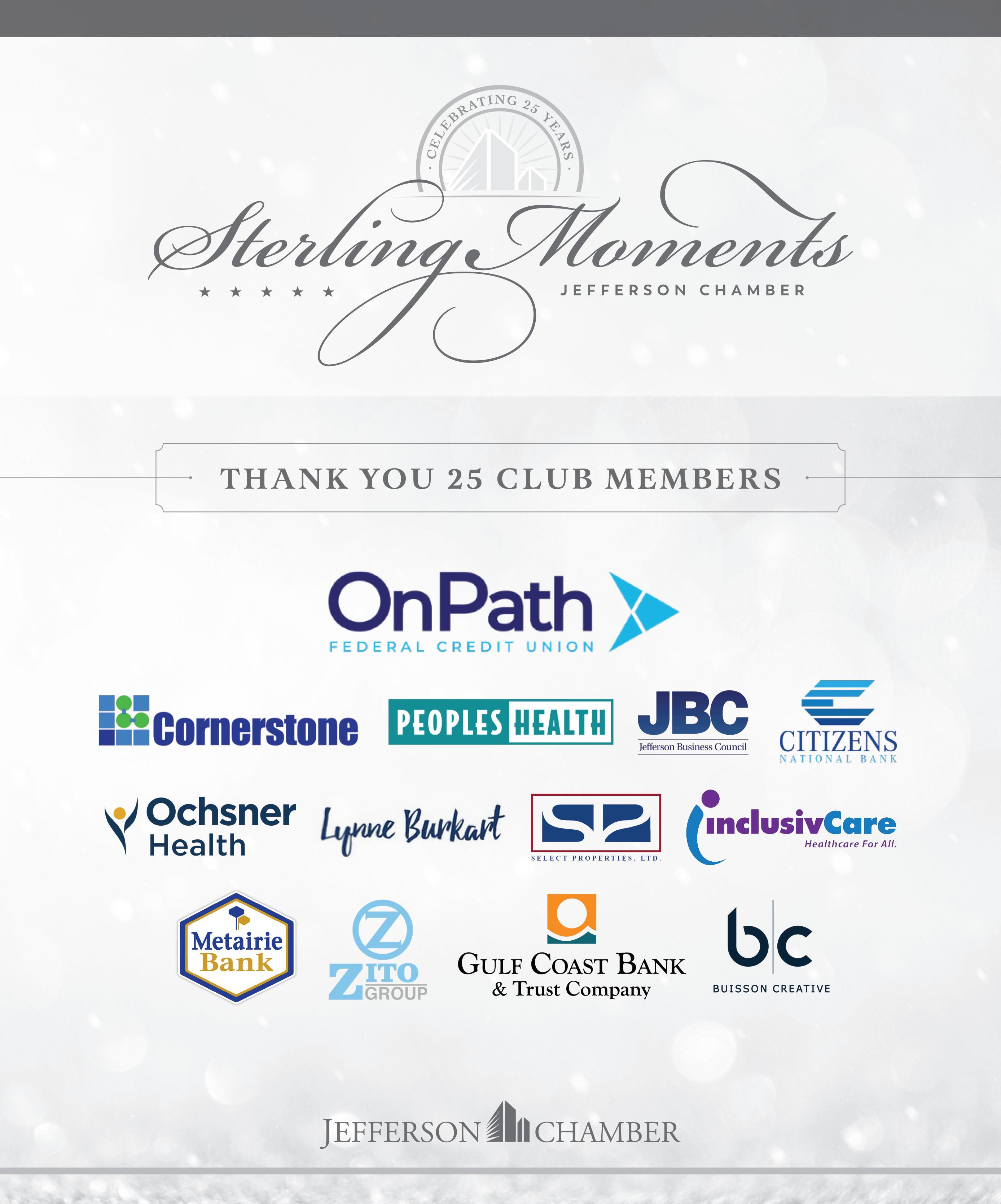
FROM THE LENS
60
WHY DIDN’T I THINK OF THAT?
Opened this past May in Metairie, The Exercise Coach uses proprietary smart equipment to help people achieve their fitness goals more efficiently.
64
NEW ORLEANS 500
Marv Ammari, CEO of Creole Cuisine Restaurant Concepts
56 GREAT WORKSPACES
Celtica French Bakery brings modern Parisian flair to Lakeview
 CELTICA FRENCH BAKERY 218 Allen Toussaint Blvd. celticabakery.com // facebook.com/celticafrenchbakery @celticafrenchbakery
CELTICA FRENCH BAKERY 218 Allen Toussaint Blvd. celticabakery.com // facebook.com/celticafrenchbakery @celticafrenchbakery
CAFÉ LIFE
Celtica French Bakery brings modern Parisian flair to Lakeview
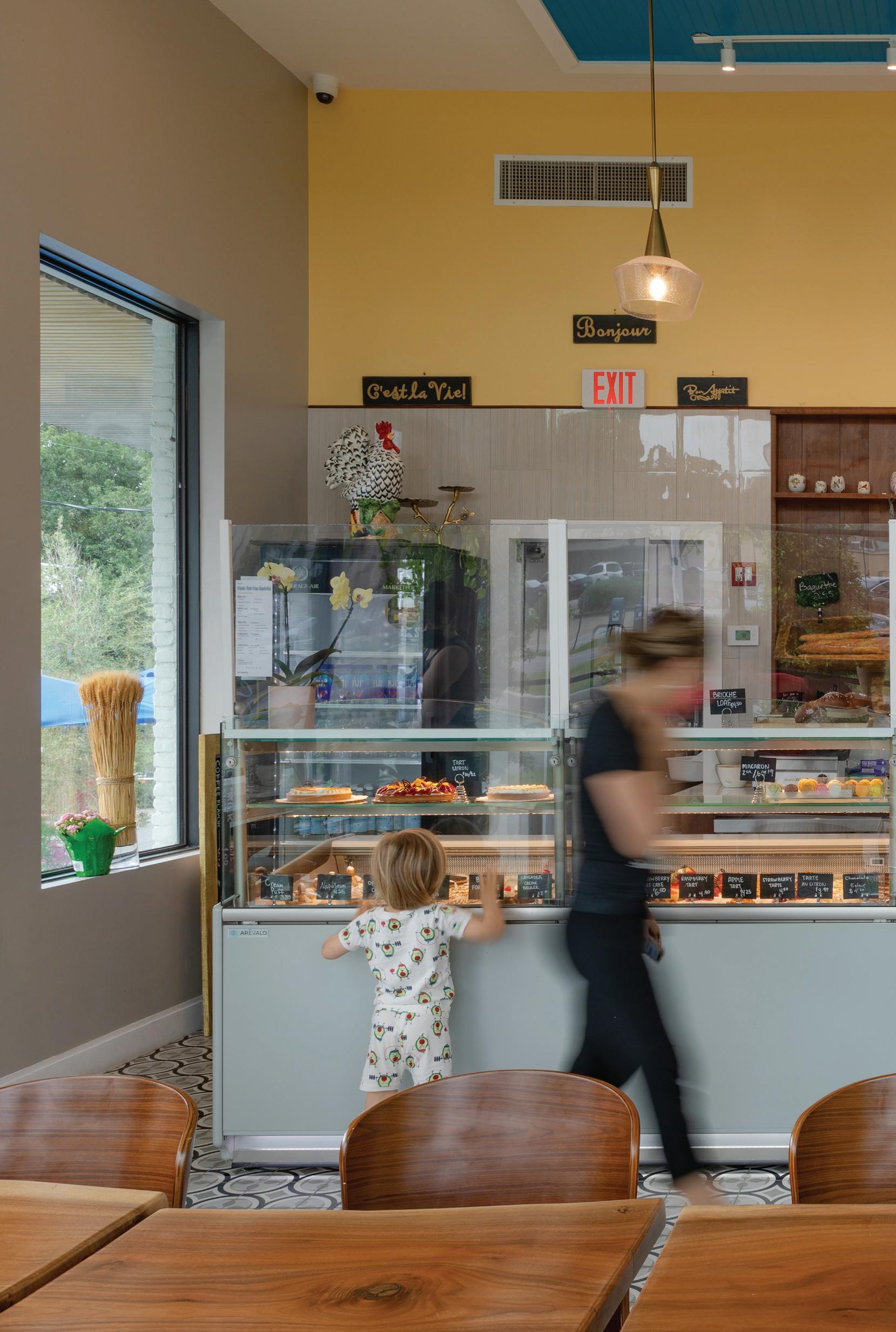 BY MELANIE WARNER SPENCER PHOTOS BY SARA ESSEX BRADLEY
BY MELANIE WARNER SPENCER PHOTOS BY SARA ESSEX BRADLEY
If while enjoying baguettes, croissants or any other offerings at Celtica French Bakery in Lakeview, you’ve been reminded of a delectable pastry you had at a French boulangerie in Paris, it’s not your imagination. Pastry chef Dominique Rizzo grew up in France, not far from Paris, in fact. Many know Rizzo from his former business La Boulangerie on Magazine Street, which he sold to the Link Restaurant Group in 2015.
In 2020, Rizzo got back in the kitchen, opening Celtica with business partner Sirlei Guidry. To make their vision for the new space a reality, Rizzo and Guidry turned to Julie Babin, principal in charge, and Daniel Kautz, project manager and designer, at studioWTA. The bakery is inside a newly built, two-tenant development that studioWTA also had a hand in designing.
Babin said Rizzo wanted a space modeled after neighborhood bakeries in his native France. From laying out the bakery equipment, which was imported from France (“by way of Canada”), to concepting the modern café aesthetic in collaboration with Rizzo and
56 BIZ NEW ORLEANS MARCH 23
FROM THE LENS GREAT WORKSPACES
To make their vision for the Lakeview space a reality, Rizzo and Guidry turned to architectural firm studioWTA. The bakery is inside a newly built, two-tenant development that studioWTA also had a hand in designing.
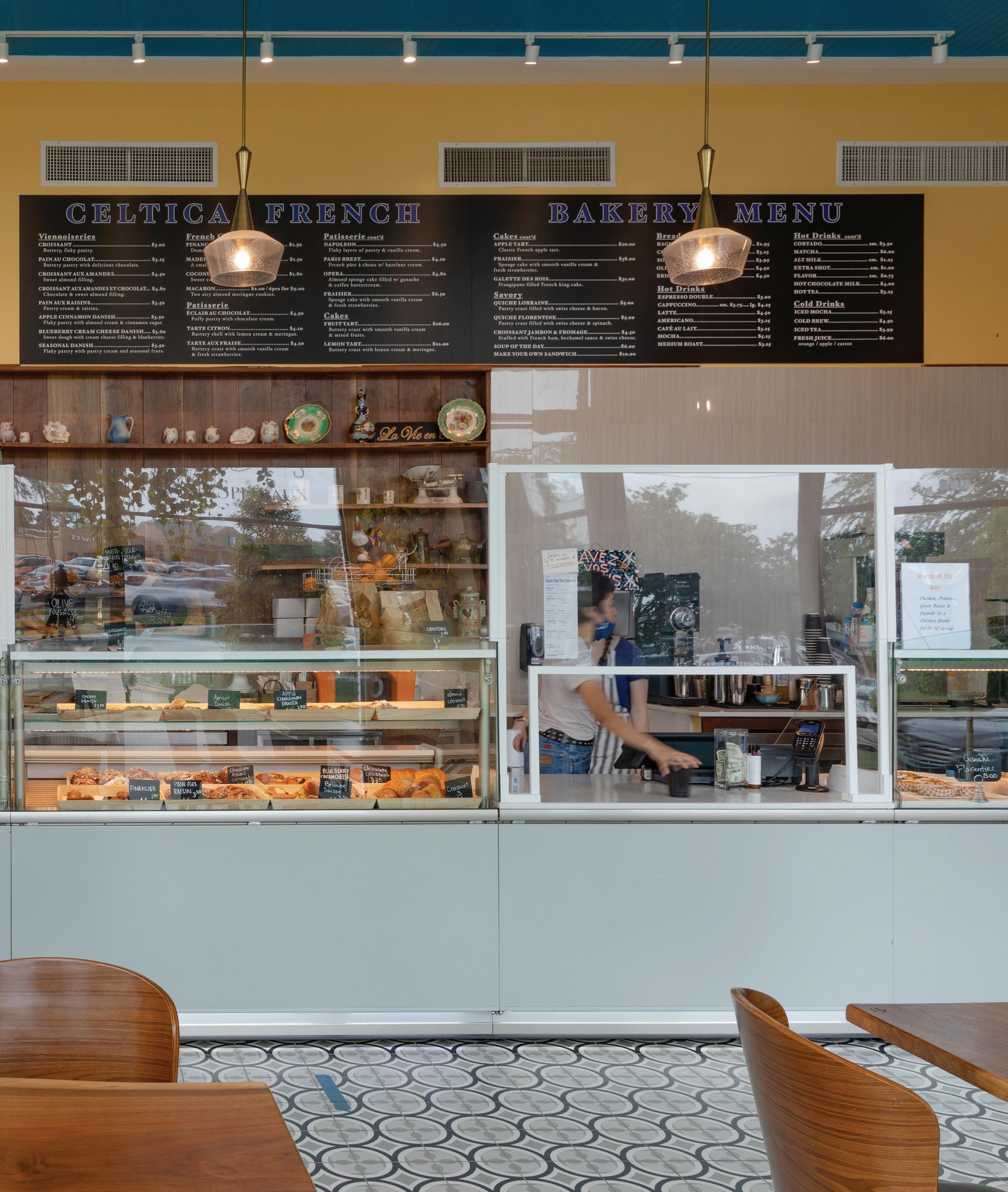
QUICK LOOK
Opening date
Oct. 7, 2020
Style architecture
Modern Square footage
1,574 square feet with a 274-square-foot patio
Persons in Charge French pastry chef Dominique Rizzo and business partner and manager Sirlei Guidry.
Architecture studioWTA with Julie Babin, principal in charge and Daniel Kautz, project manager and designer
Furnishings and art
Selected by owner Dominique Rizzo and Sirlei Guidry; the paintings in the space are by Simon Hardeveld, a New Orleans-based French artist and friend of Rizzo.
“ ”
The name Celtica was chosen as a reference to the Celtic history of France, a region where [pastry chef and co-owner] Dominique [Rizzo] is native.
Guidry, Babin said the goal was to create a warm and inviting space. She recently took time to share more details about the bakery’s design.
What were the client’s top priorities for this project?
Julie Babin: After several years without a bakery, following the sale of La Boulangerie, Dominique wanted to open in another neighborhood. He wanted his space to be warm, modern and welcoming. He also made a large investment to import French baking equipment.
What were the design team’s goals?
Babin: A French bakery that blends tradition with contemporary design. The name Celtica was chosen as a reference to the Celtic history of France, a region where Dominique is native.
What was the biggest design challenge?
Babin: Allen Toussaint Boulevard is a neighborhood corridor that can sometimes feel more
oriented to cars than to pedestrians. The bakery needed a street presence that would appeal to someone driving by but also contribute a sense of walkability. The team sited the cafe seating at the primary corner and opened that space up with expansive glazing. Additionally, we provided for covered outdoor seating along the side street so that it would feel more private, and less busy than the flow of Allen Toussaint. Another challenge was maximizing the seating area. Commercial kitchens typically require a large portion of floor area, but even more so at Celtica, where the kitchen and service areas consume almost 75% of the available square footage. The team utilized large expanses of glass, window seating, and two-top tables to allow the seating area to feel as large as possible.
What is the standout feature of the design?
Babin: We wrapped the seating area with custom-built steel windows and a steel plant
ledge built into the windows at transom height to create a garden cafe feel with daylight filtered by hanging plants. This helped to create a calm interior on a busy street and offer enticing views from the street.
For the exterior, we designed a steel and wood awning that creates shade and protects an outdoor seating garden. There is an intimate entry porch centered between the two tenant spaces and a rear entry via a shared common hallway at the rear parking lot. The design team helped create custom reclaimed cypress shelving, counters and a bench for the interior buildout.
Where did you glean inspiration for the project?
Babin: We see the project as part of the Lakeview neighborhood’s recent efforts to expand an underdeveloped stretch of the commercial corridor with small businesses that improve the neighborhood life. T
The design team created a serene, garden-like atmosphere inside the café by maximizing natural light via a large expanse of windows and adding a steel plant ledge.

58 BIZ NEW ORLEANS MARCH 23
ADDITIONAL IMAGES AT BIZNEWORLEANS.COM
“The bakery needed a street presence that would appeal to someone driving by but also contribute a sense of walkability,” said Julie Babin, studioWTA principal in charge. “The team sited the cafe seating at the primary corner and opened that space up with expansive glazing. Additionally, we provided for covered outdoor seating along the side street so that it would feel more private, and less busy than the flow of Allen Toussaint Boulevard.”

FROM THE LENS
WHY DIDN’T I THINK OF THAT?
THE WORKOUT OF THE FUTURE IS HERE
Opened this past May in Metairie, The Exercise Coach uses proprietary smart equipment to help people achieve their fitness goals more efficiently.
 BY ASHLEY MCLELLAN PHOTOS BY EDMUND D. FOUNTAIN
BY ASHLEY MCLELLAN PHOTOS BY EDMUND D. FOUNTAIN
60 BIZ NEW ORLEANS MARCH 23
THE EXERCISE COACH 2701 Airline Dr., Metairie Exercisecoach.com/metairie
In this post-pandemic world, those looking to stay healthy or get fit are more likely than ever to ditch crowded, sweaty gyms in favor of other alternatives.
This past May, one such alternative opened in Metairie — The Exercise Coach, a national line of personal trainers and computer assisted-workout studios. A step into the future of exercising, The Exercise Coach studios boast equipment that evaluates each client’s abilities and strengths — including baseline muscle conditions — then uses that information to design a custom workout for a coach and client to follow.
The Exercise Coach provides a safe, customized workout at its 1,400-squarefoot studio in Metairie, providing an alternative to more crowded, standard gym settings.
Continuous data is then used to adjust the tension of the machines as the person advances in their fitness, increasing difficulty gradually to achieve progress and maximize results.
The Exercise Coach has studios in 33 states, and touts that it was ranked the No. 1 “Fastest Growing Personal Training Brand in America” in 2021 and 2022 by Entrepreneur magazine.

The Metairie location, the first in the state of Louisiana, is a 1,400-square-foot studio at 2701 Airline Drive — the corner of Airline and Labarre Road — that was opened by Theresa Hayes, who is already planning to open two more locations in the next few years.

Just as medicine has recognized the benefits of personalized treatment programs in recent years, Hayes said the benefits of using artificial intelligence to create personalized workouts are clear.
“Our approach is based on the science, which proves that muscle quality matters more than movement quantity. Muscle quality declines as we age… Our particular strength training sessions help to reverse this, and by doing so can have a huge impact on reversing osteoporosis, high blood pressure, diabetes and several other issues. It also helps with balance and coordination as we age.”
For Hayes, buying into the franchise— an investment that typically ranges from $127,000 to $298,000 — has already proven fruitful.
“We are currently at around 80 clients,” she said. “The feedback has been amazing. I have received many online comments regarding my team and their coaching abilities. [Clients] appreciate the personal attention they receive and our commitment to push them to achieve
61 BIZNEWORLEANS.COM
their goals. They love the equipment and the efficiency of the workout. They also love that it is a private, clean studio. No one will be walking in off the street to utilize our facility. It is one-on-one coaching, by appointment only. We also have clients telling us how they couldn’t bend over or get up off the floor without assistance. Now they are handling those daily movements on their own.”

Pairing coaches and customized workouts also enables workouts to be shorter and more efficient, something that a January 2023 report by Men’s Health magazine noted is currently a growing trend.
“For lots of people, the focus on gym workouts will come with a time crunch,” said the report. “Even if some aspects of home workouts have lost their luster, you can’t deny the benefit of the five second commute. With that in mind, trainers are becoming more efficient with the way they’re programming for their clients… In other words, 2023 will be the year of maximum efficiency.”
For Hayes, the venture is part of a major career shift away from years of working in the restaurant and hospitality industry.
“I am 56 years old and have been in the restaurant industry my whole career,” she said. “Fitness has been near and dear to me [since] I turned 40. At that time, I was not necessarily in my best health, and I decided that it was time to do something about it. I quit smoking and started running, cycling and cross training and it impacted my life in such a positive way.”
Hayes said her hospitality background has served her well in her new venture.

“Restaurants are a service industry and so is fitness coaching,” she said. “I have always known that my purpose is to serve others. My one and only hope is to continue to impact lives. I truly want all my clients to experience a major turnaround in how they feel, both physically and mentally, on a day-to-day basis. I live to see them feeling the changes happening over time with their overall health. Nothing makes me happier.” T

62 BIZ NEW ORLEANS MARCH 23 ADDITIONAL IMAGES AT BIZNEWORLEANS.COM
The franchise’s first Louisiana location was opened by Theresa Hayes (left), along with Studio Manager Marie Williams (right), as a way to embrace Hayes’s passion for fitness as she transitioned from work in the hospitality industry to something new.

63 BIZNEWORLEANS.COM
FROM THE LENS NEW ORLEANS 500
Marv Ammari
CEO of Creole Cuisine Restaurant Concepts
DID YOU KNOW?
In 1989, Marv Ammari began his hospitality career by taking over a daiquiri shop in St. Bernard Parish. With help from his brothers, Zeid and Richy, he’s grown the business into Creole Cuisine Restaurant Concepts, a company that owns more than 20 restaurants, including Broussard’s, Tommy’s, Cafe Maspero and the Bombay Club.
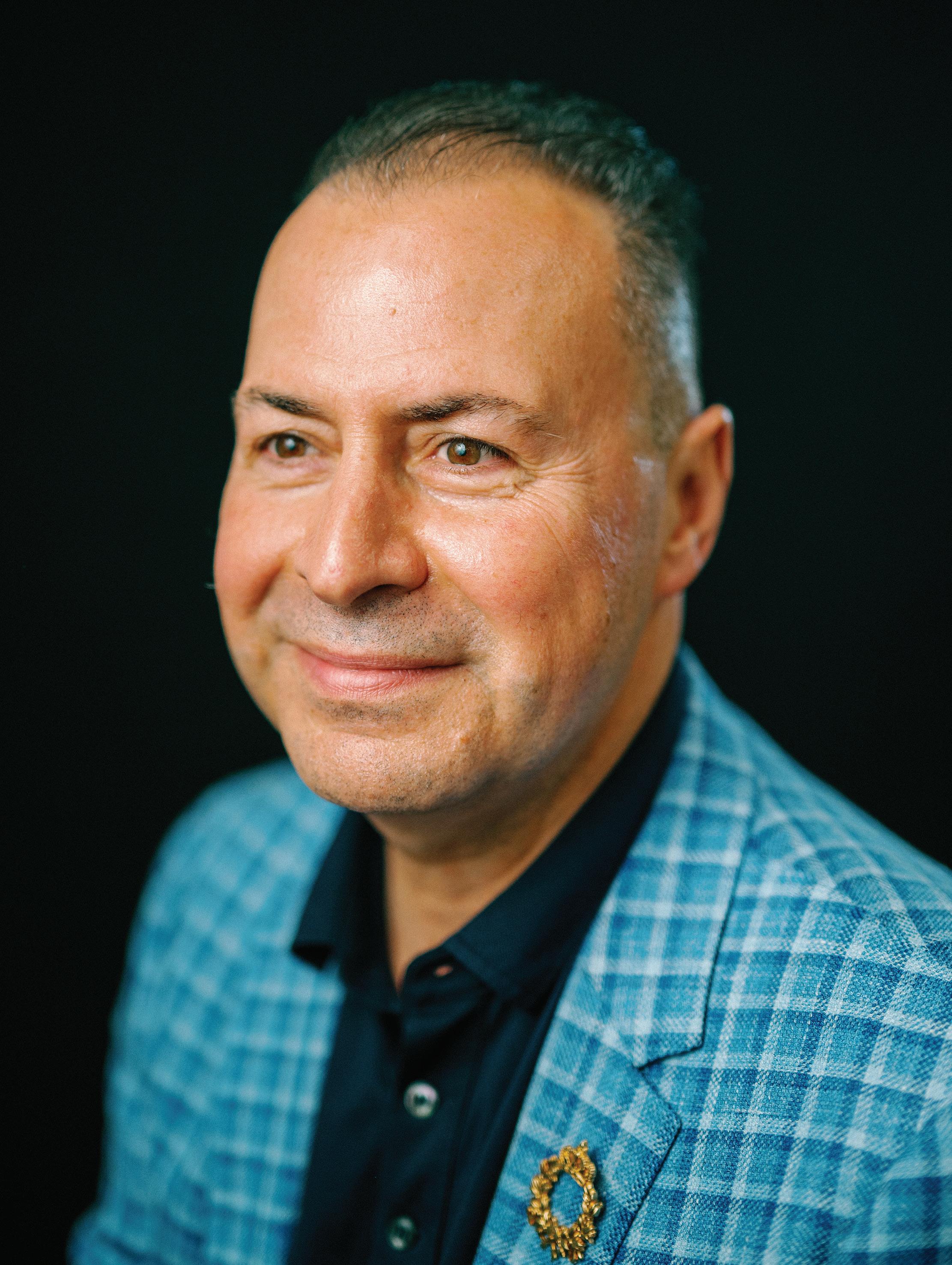
Best Fest: French Quarter Festival. I love to see the locals come out and enjoy the French Quarter.
Hidden Gem: I really enjoy visiting the Napoleon House. Every time I go there, I feel like it is a step back in time. It’s a great place to enjoy a classic cocktail.
On the Horizon: We have made a company decision to grow Boulevard American Bistro regionally. We are looking forward to opening a location outside of the greater metropolitan area soon.
Advice: Try to learn one thing and teach one thing every day.
Nonprofit: Personally and professionally, I support the important work of the New Orleans Mission.
64 BIZ NEW ORLEANS MARCH 23
PHOTO BY MIKE LIRETTE
ADDITIONAL Q+A ONLINE AT BIZNEWORLEANS.COM




































 BY RICH COLLINS
BY RICH COLLINS


































 Engineering
Engineering

















 by Keith Twitchell
by Keith Twitchell













 CELTICA FRENCH BAKERY 218 Allen Toussaint Blvd. celticabakery.com // facebook.com/celticafrenchbakery @celticafrenchbakery
CELTICA FRENCH BAKERY 218 Allen Toussaint Blvd. celticabakery.com // facebook.com/celticafrenchbakery @celticafrenchbakery
 BY MELANIE WARNER SPENCER PHOTOS BY SARA ESSEX BRADLEY
BY MELANIE WARNER SPENCER PHOTOS BY SARA ESSEX BRADLEY



 BY ASHLEY MCLELLAN PHOTOS BY EDMUND D. FOUNTAIN
BY ASHLEY MCLELLAN PHOTOS BY EDMUND D. FOUNTAIN









